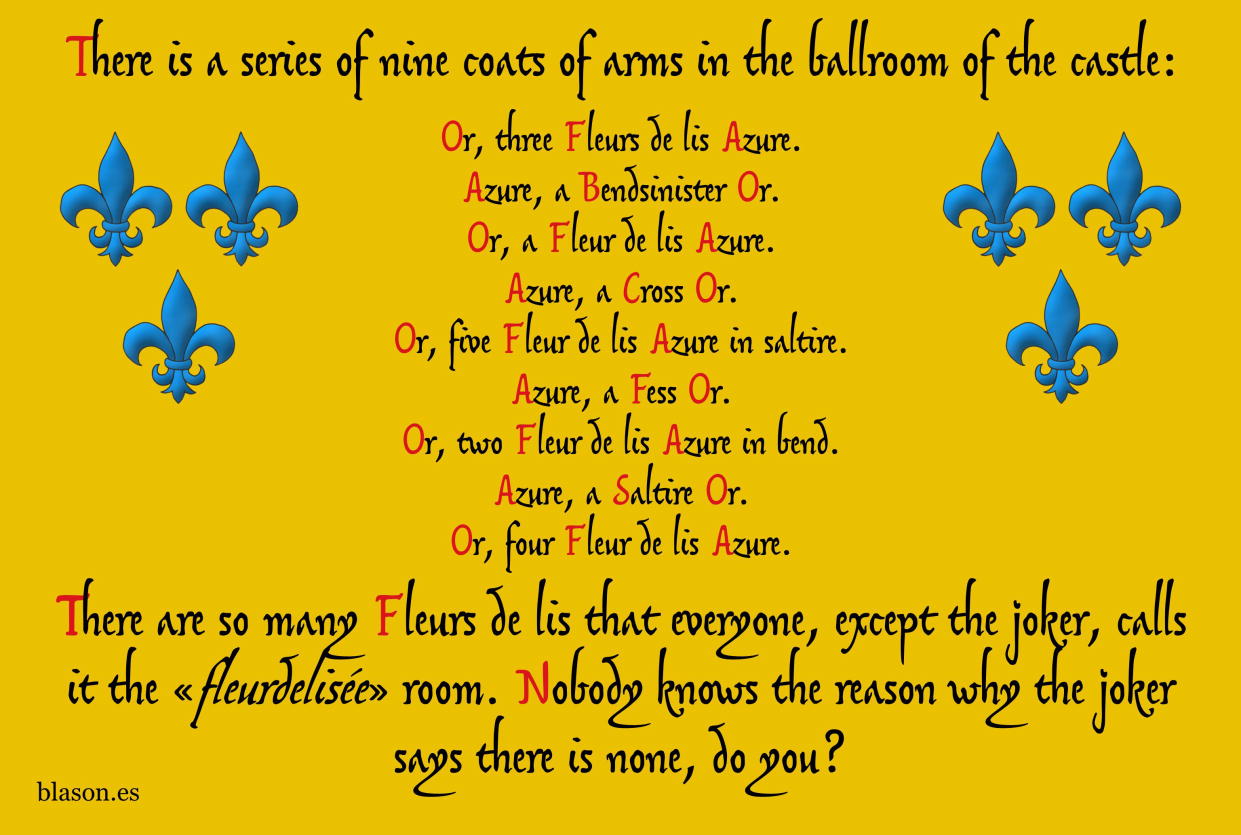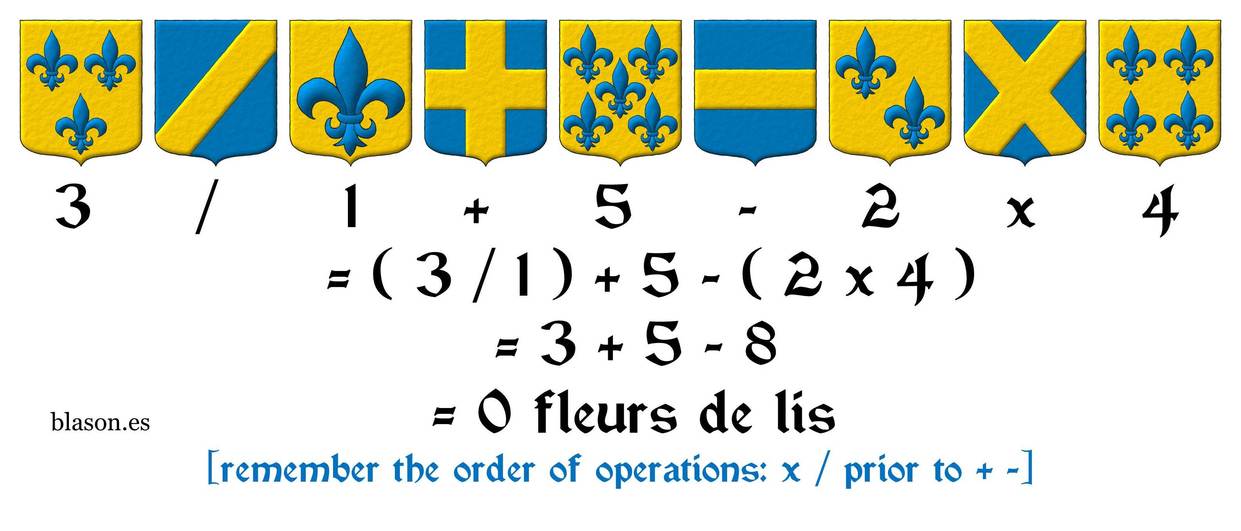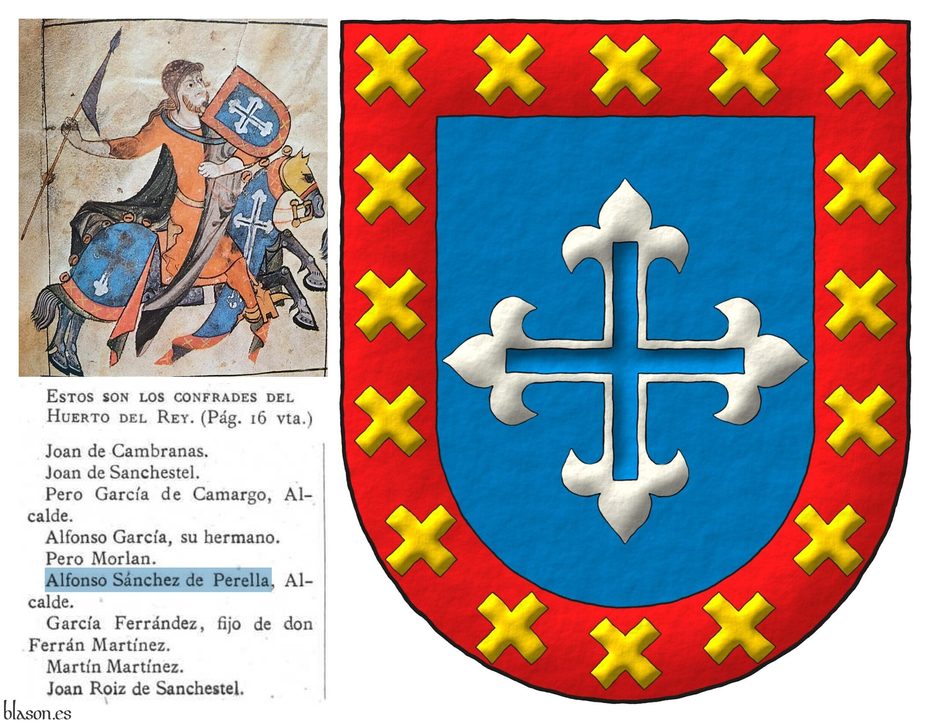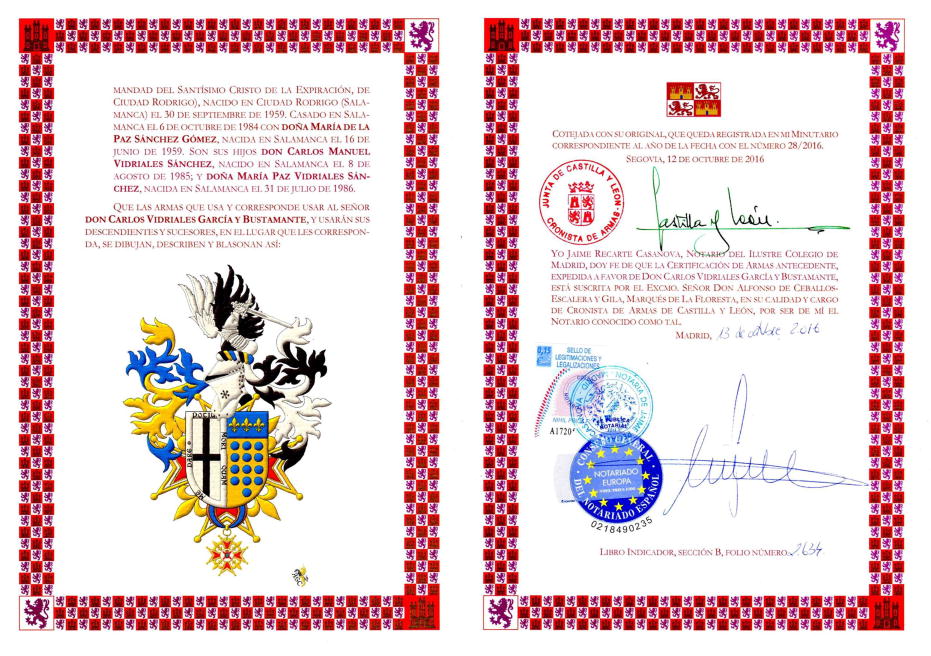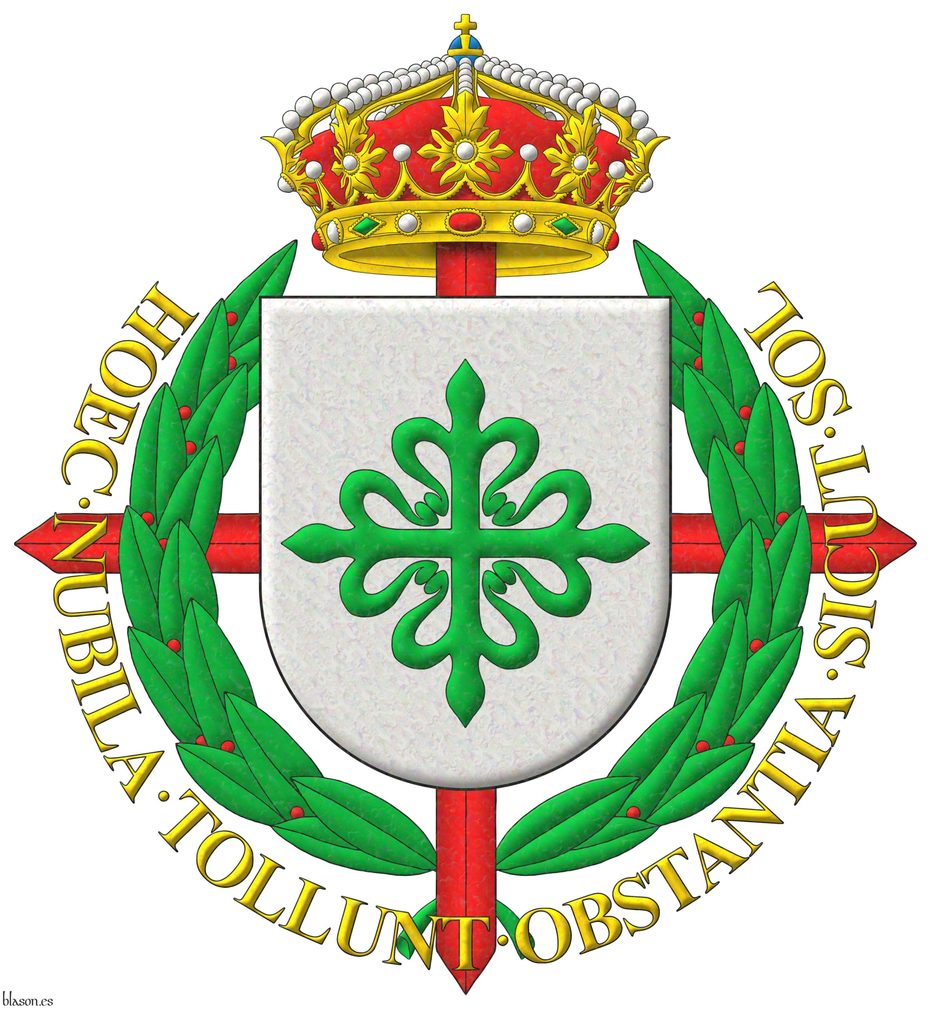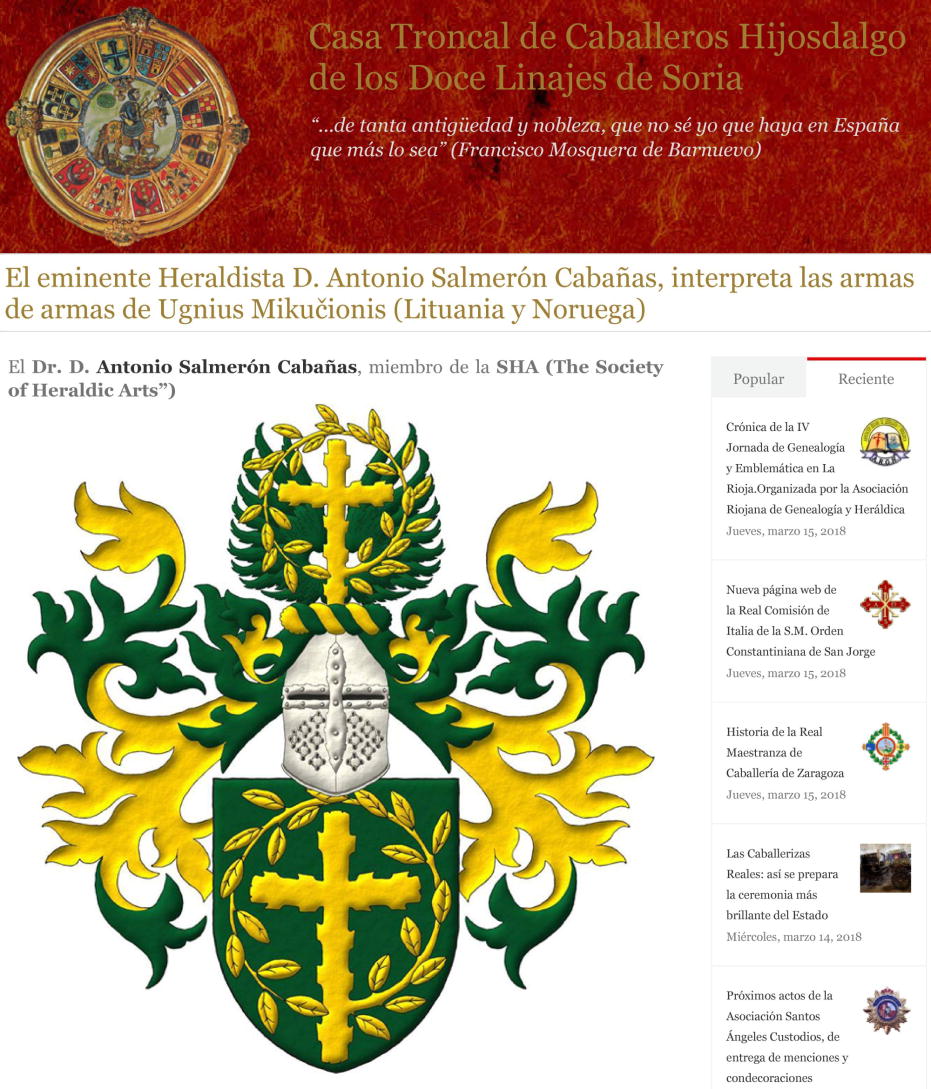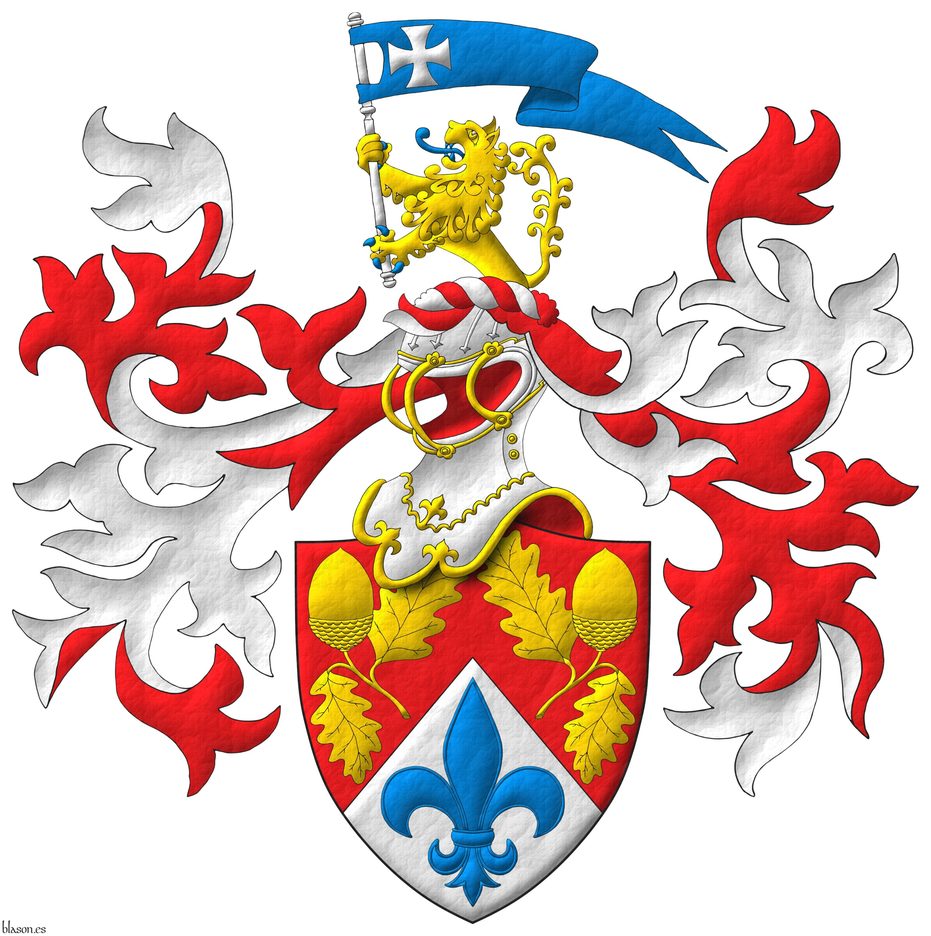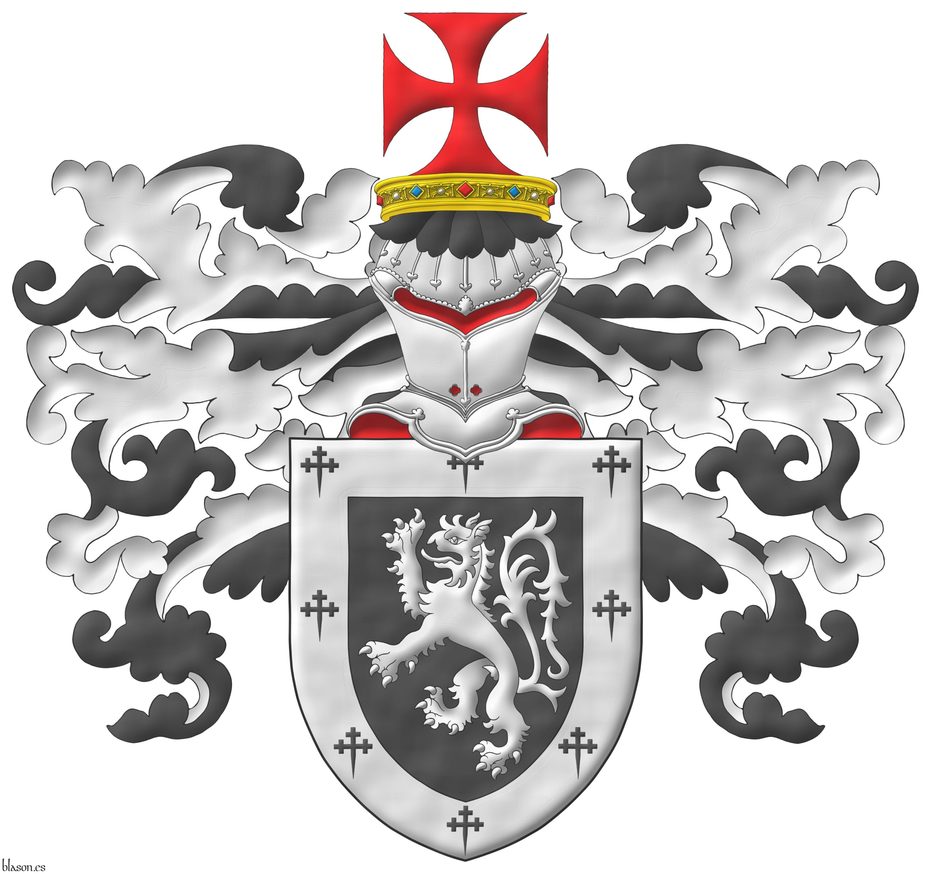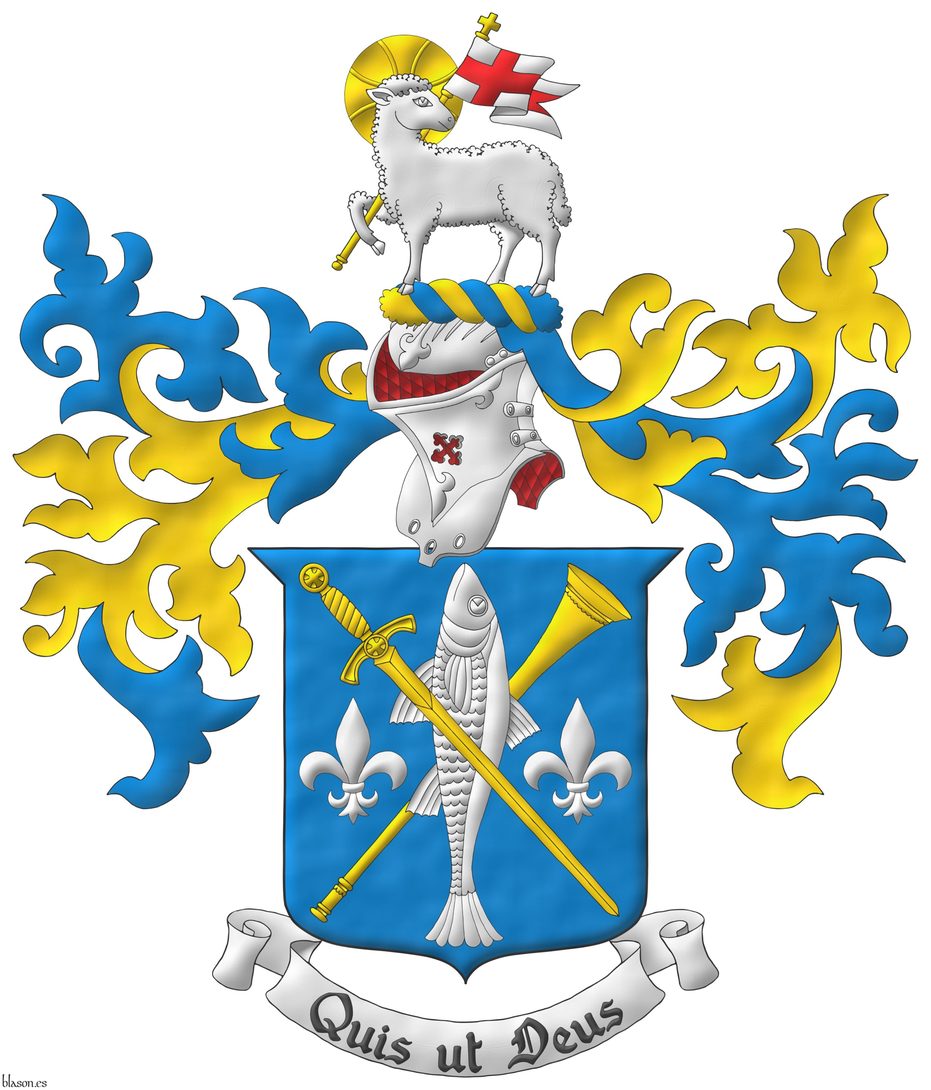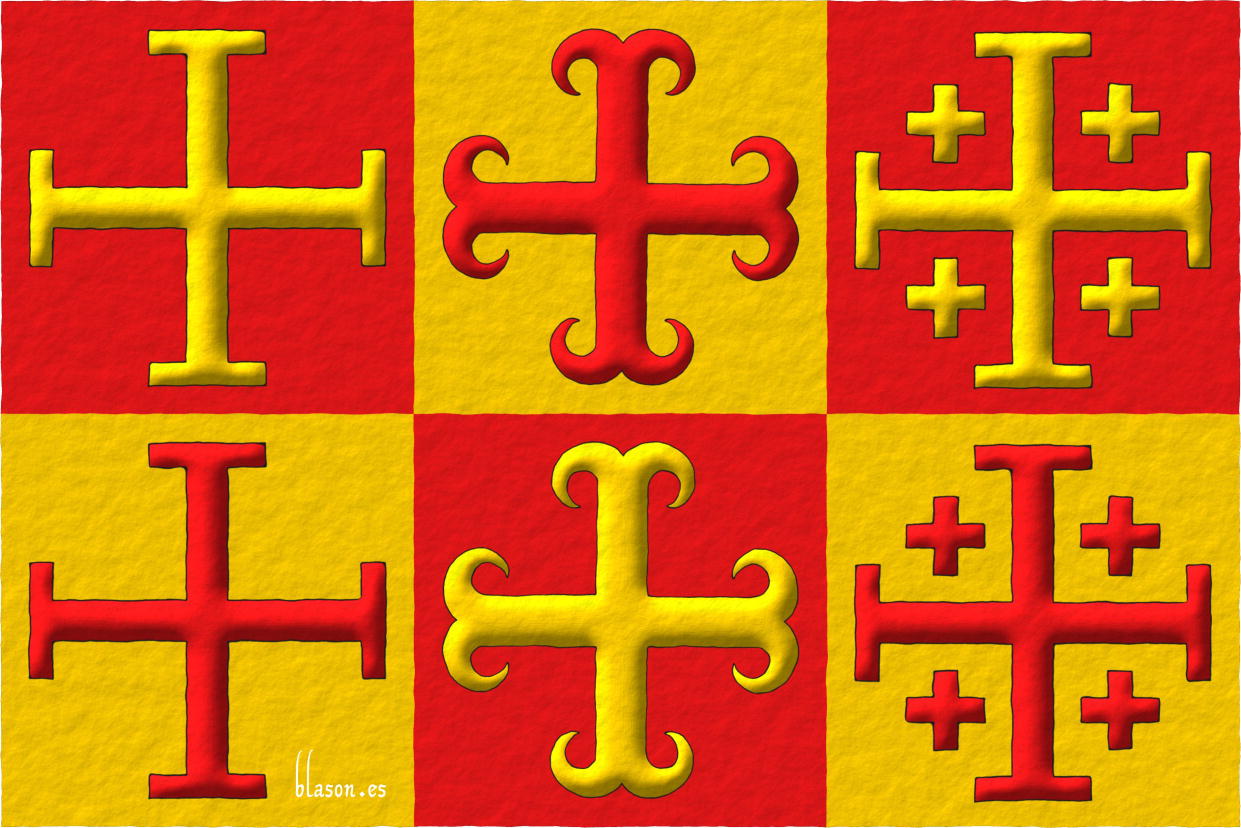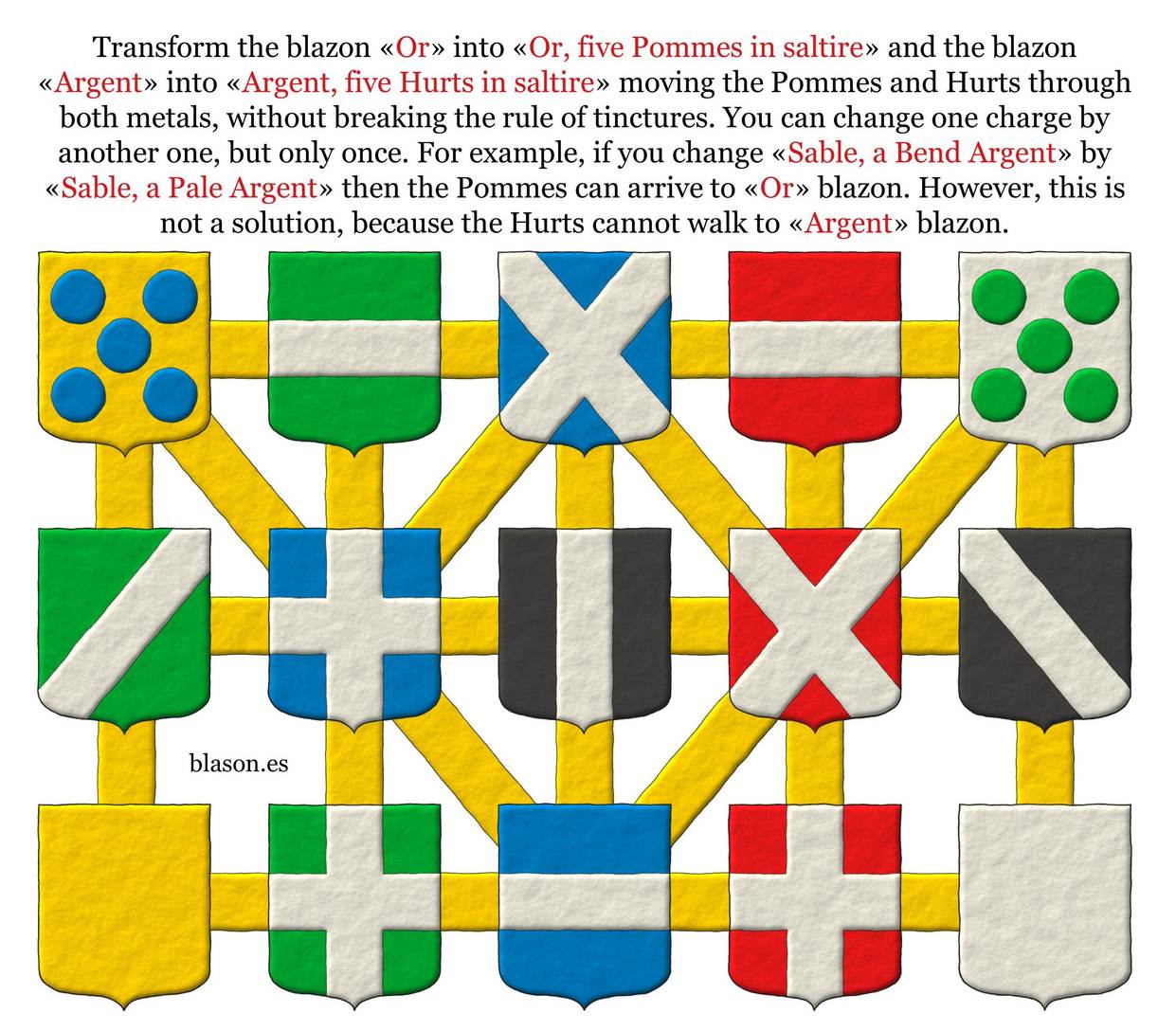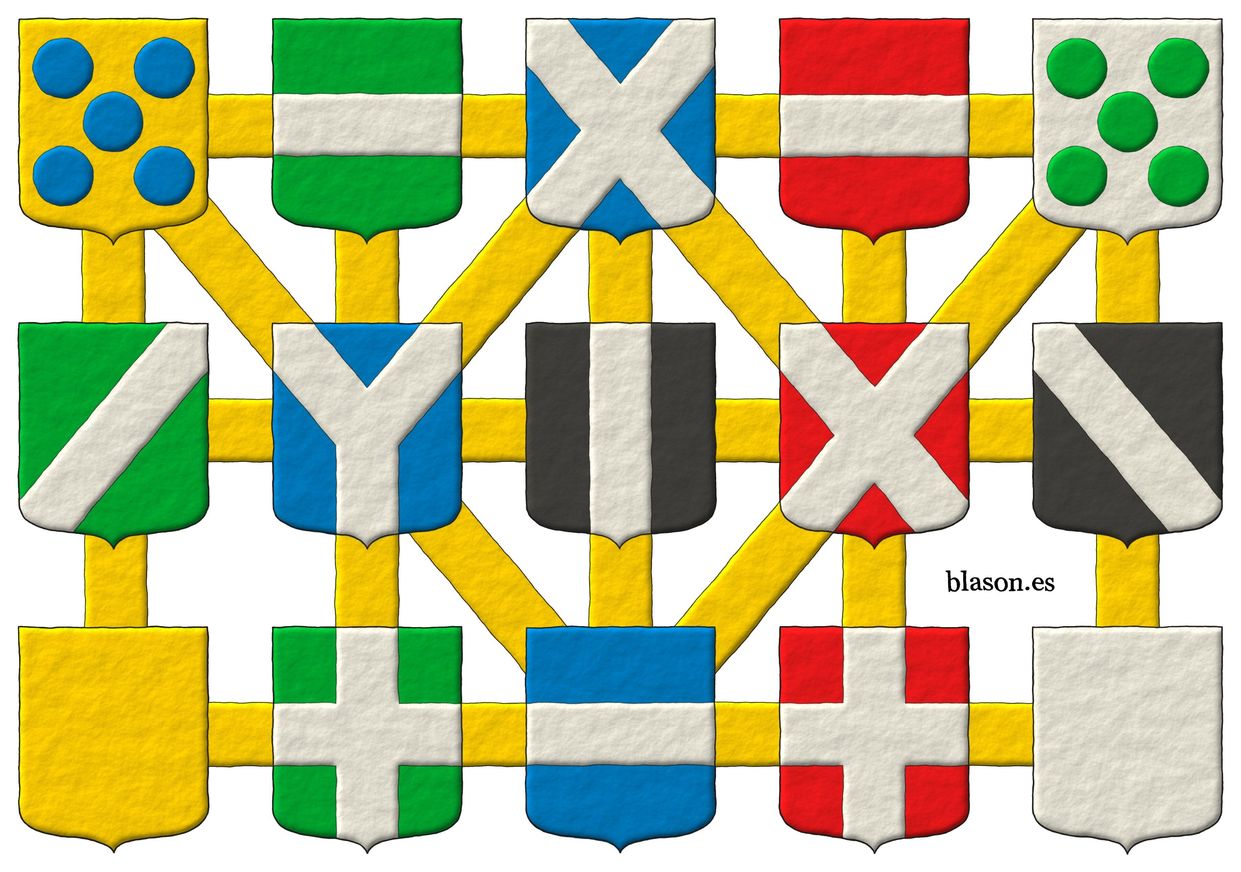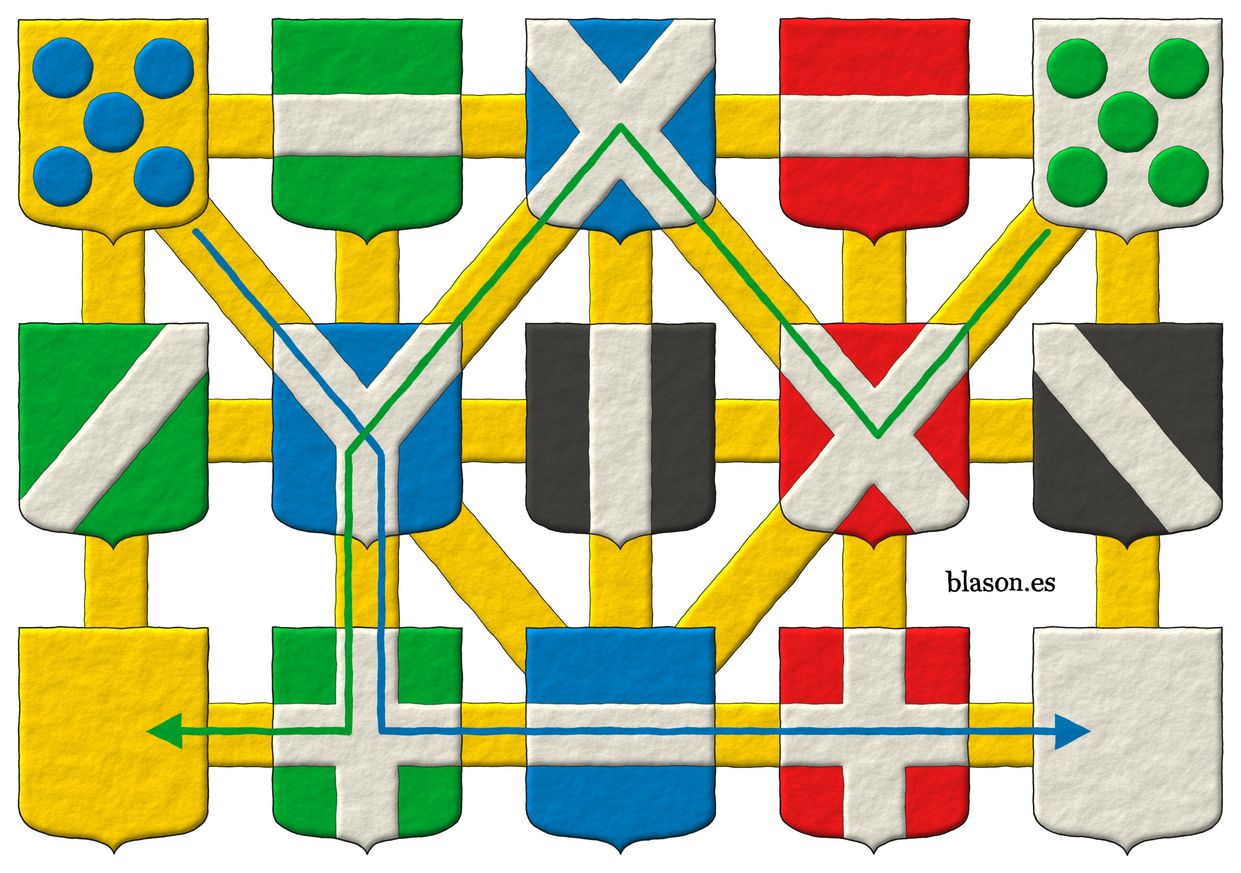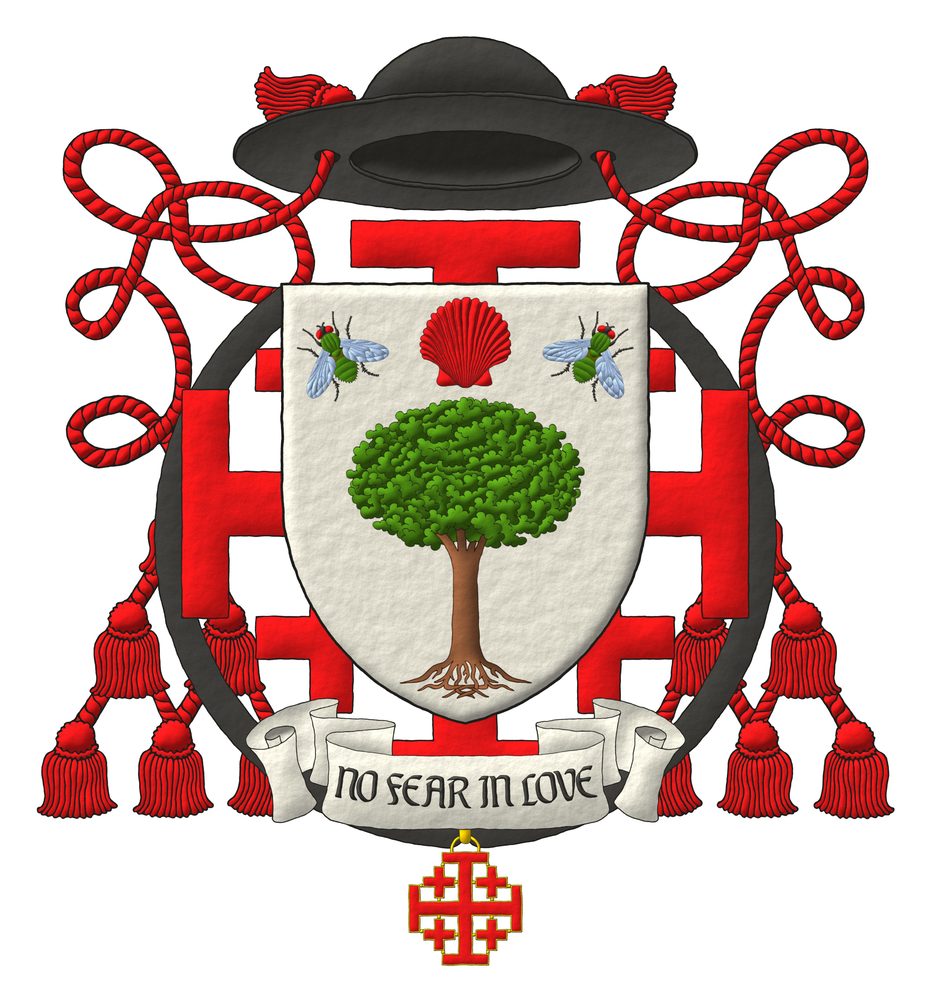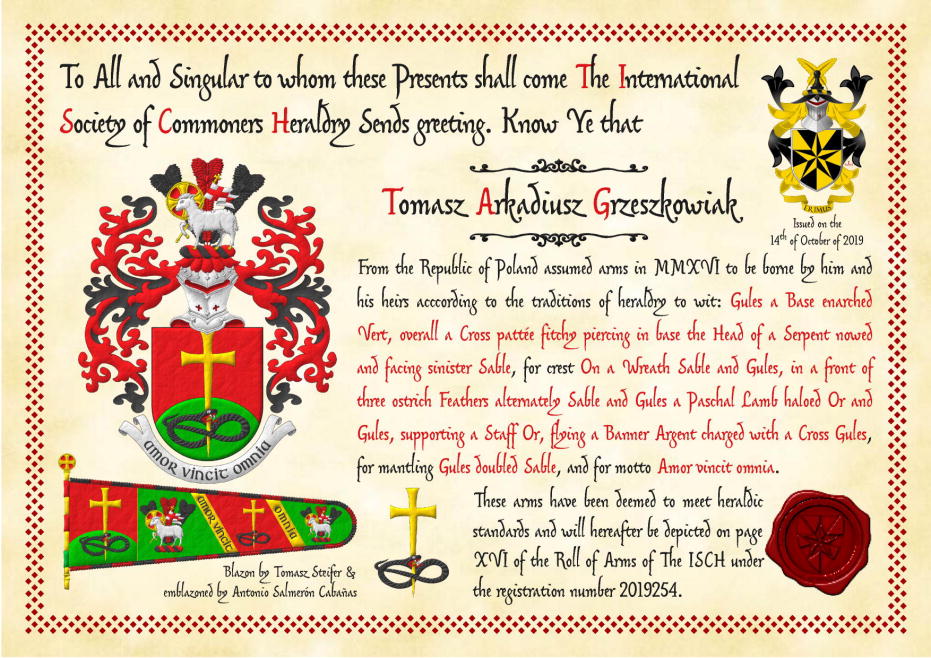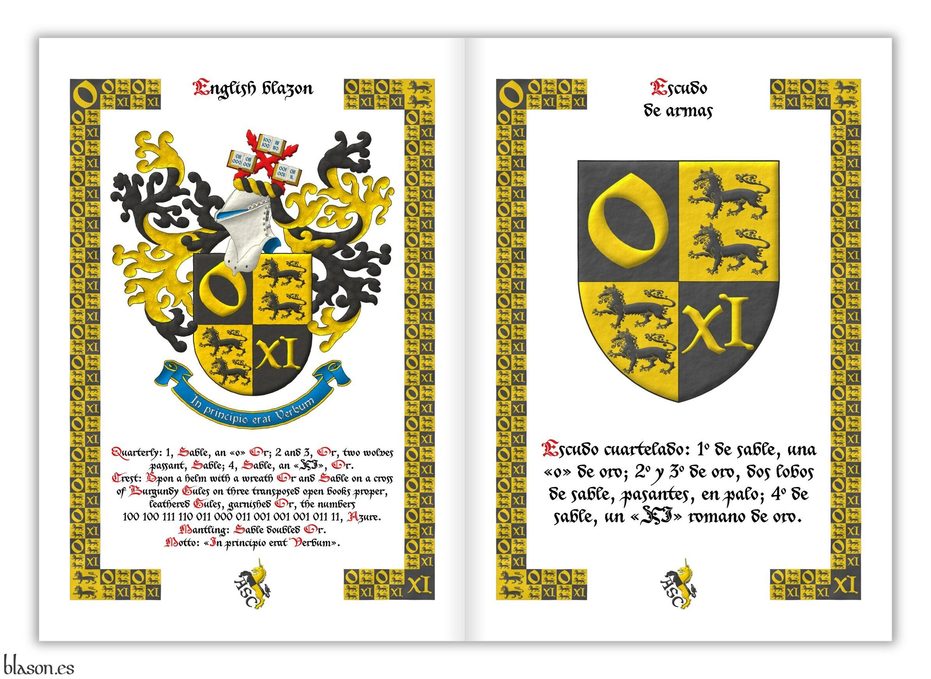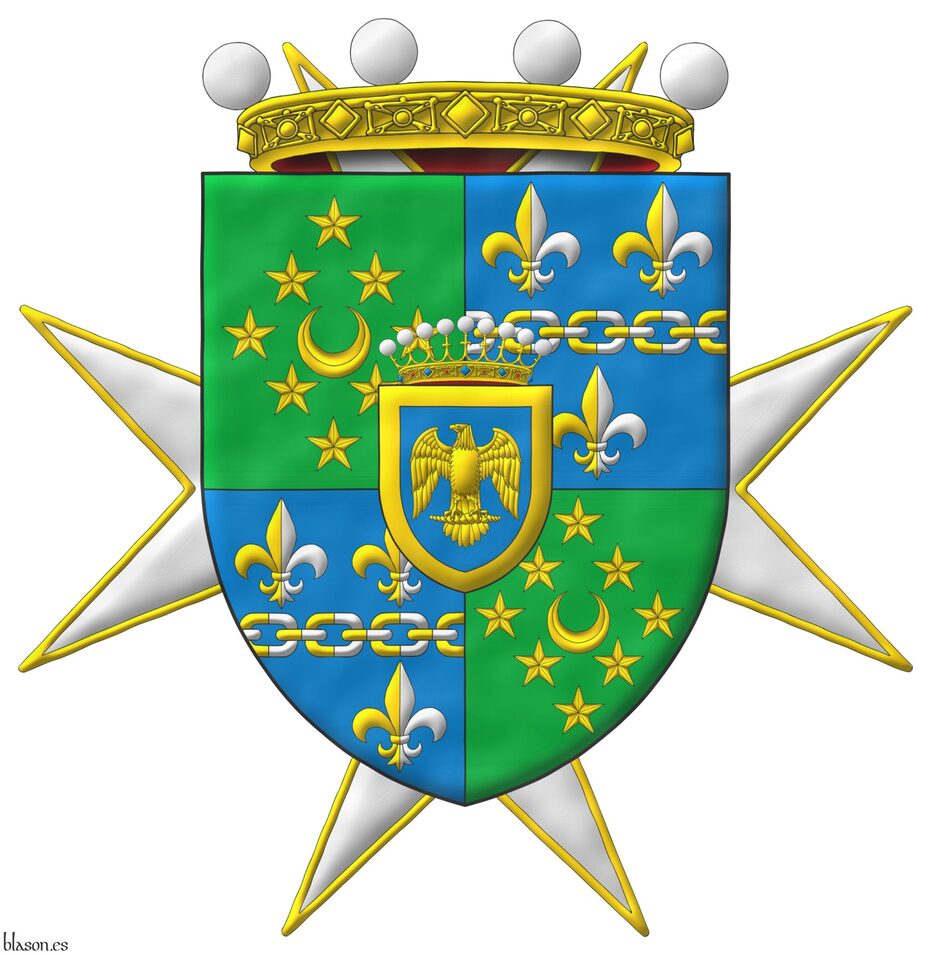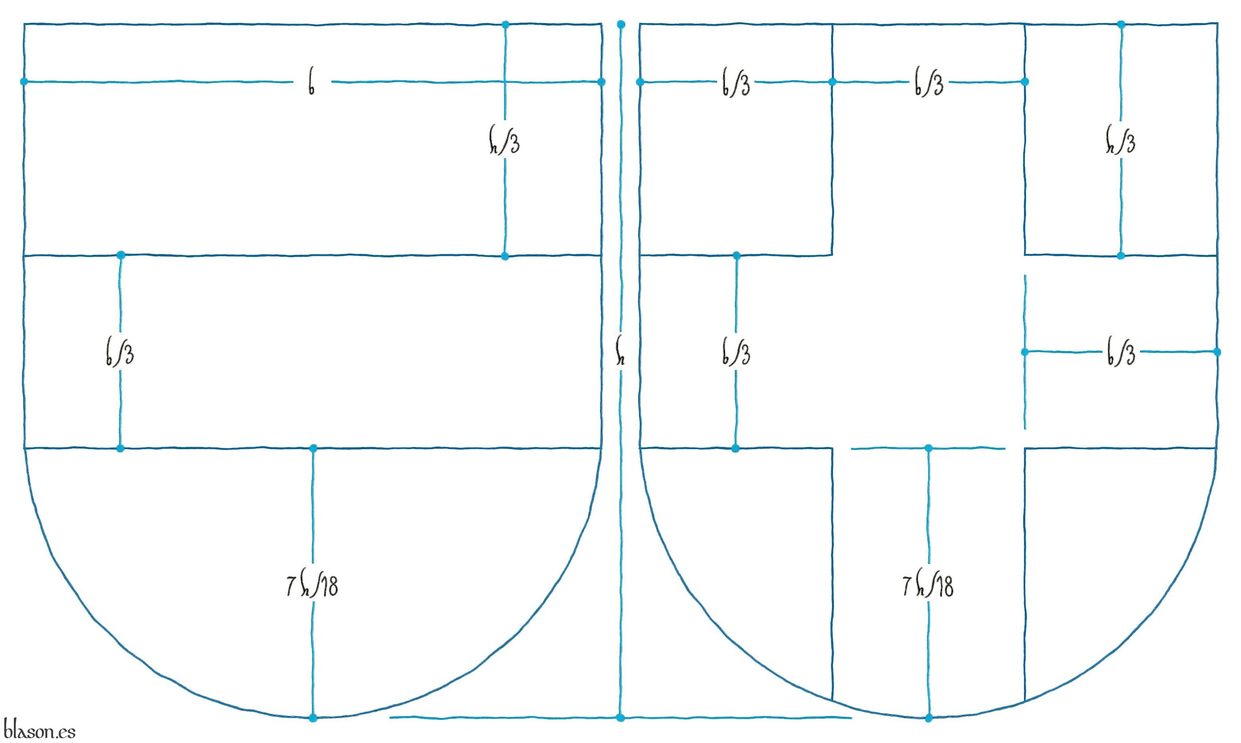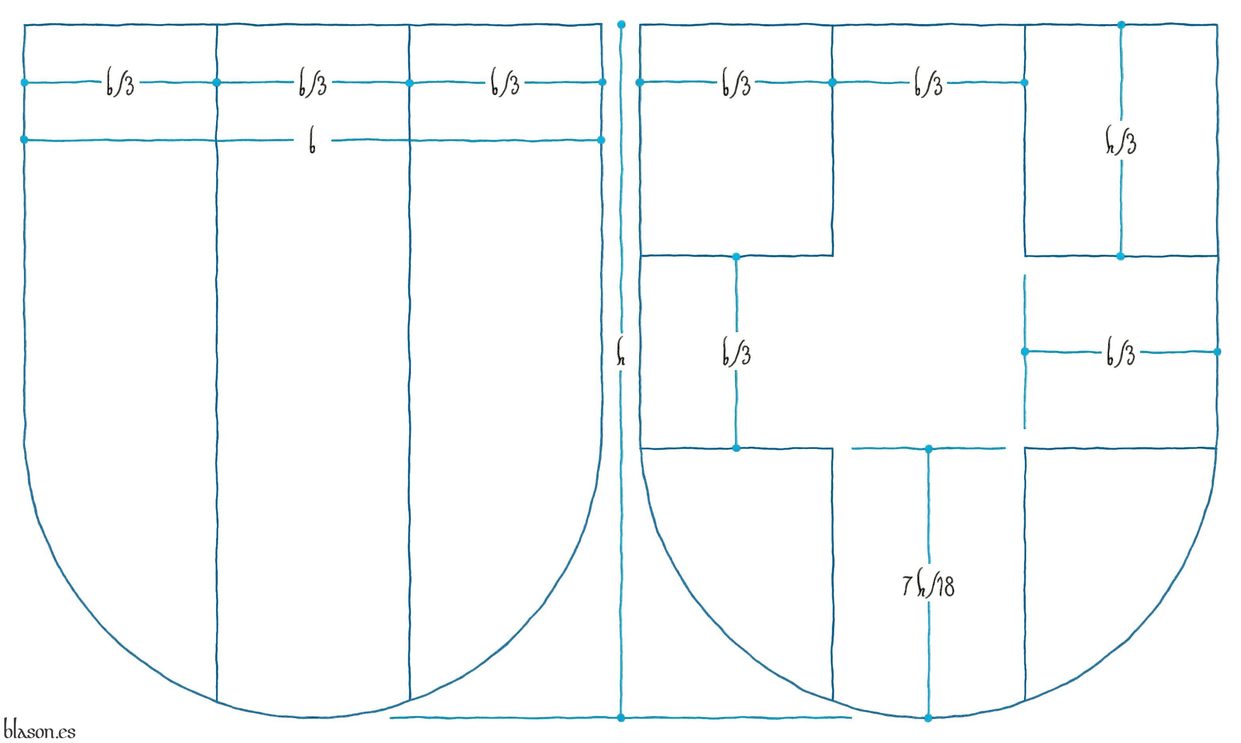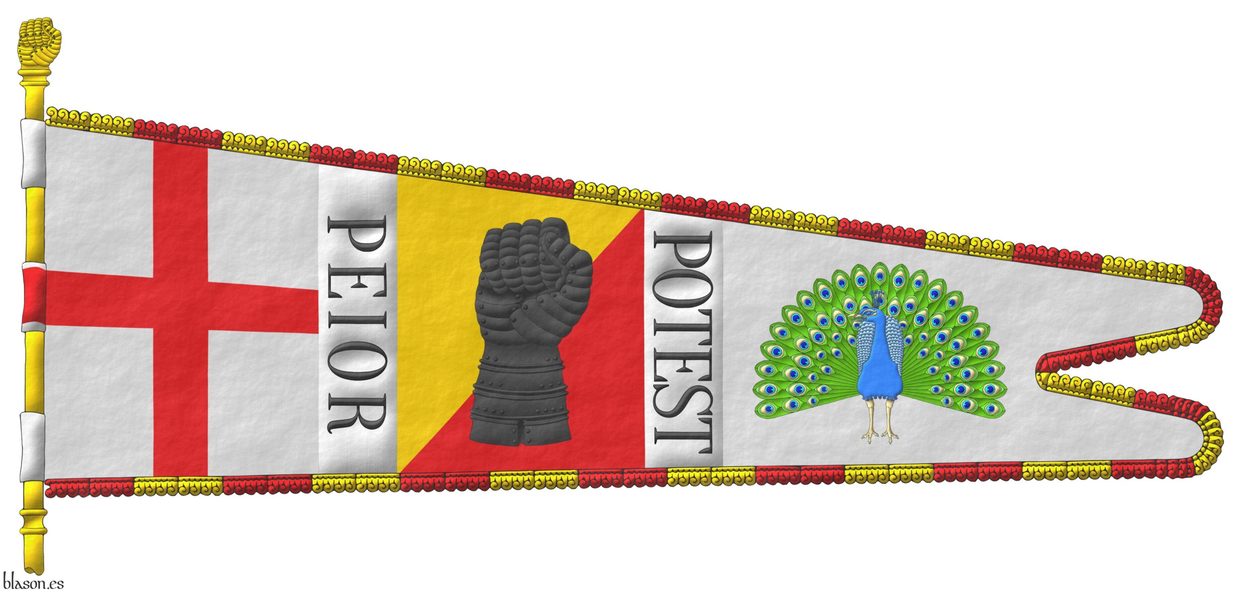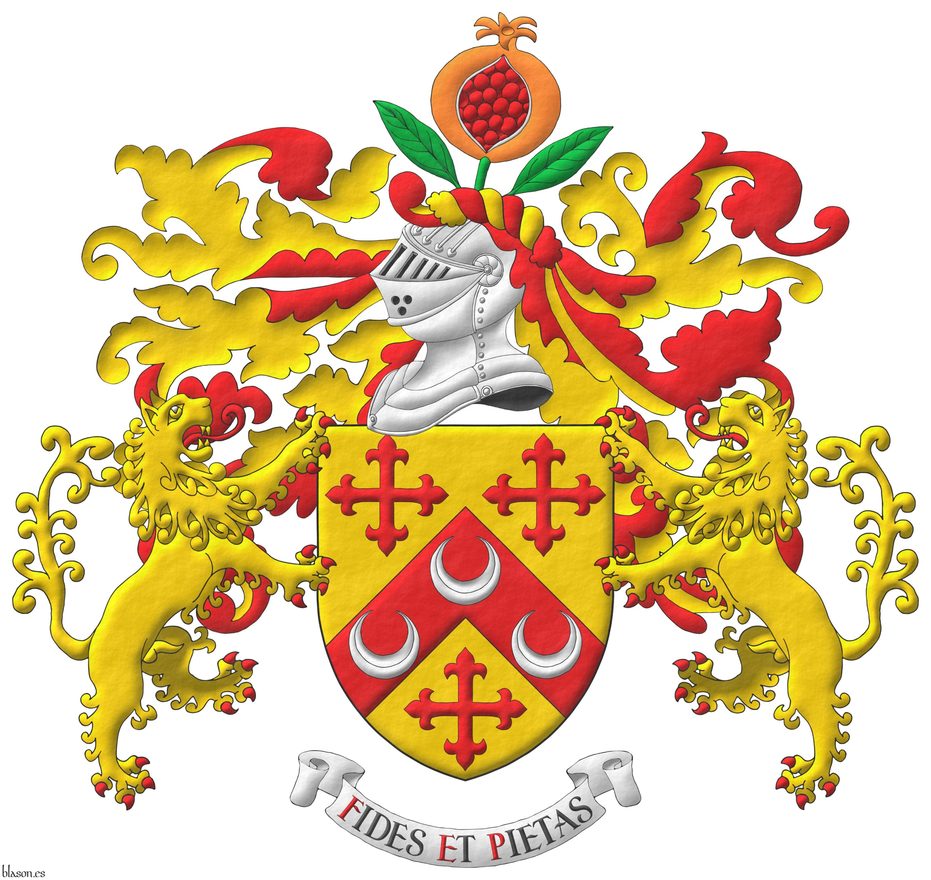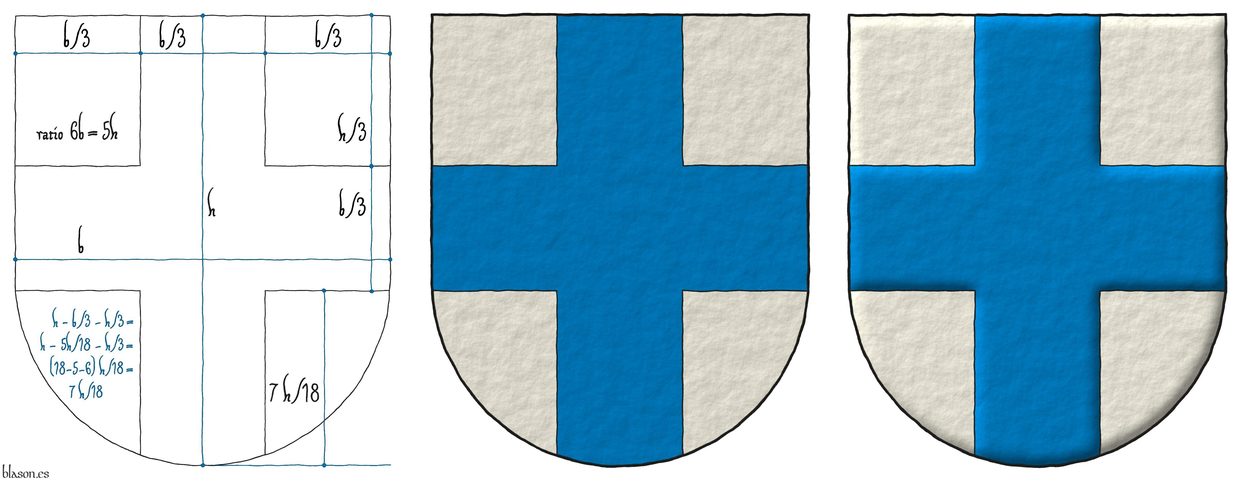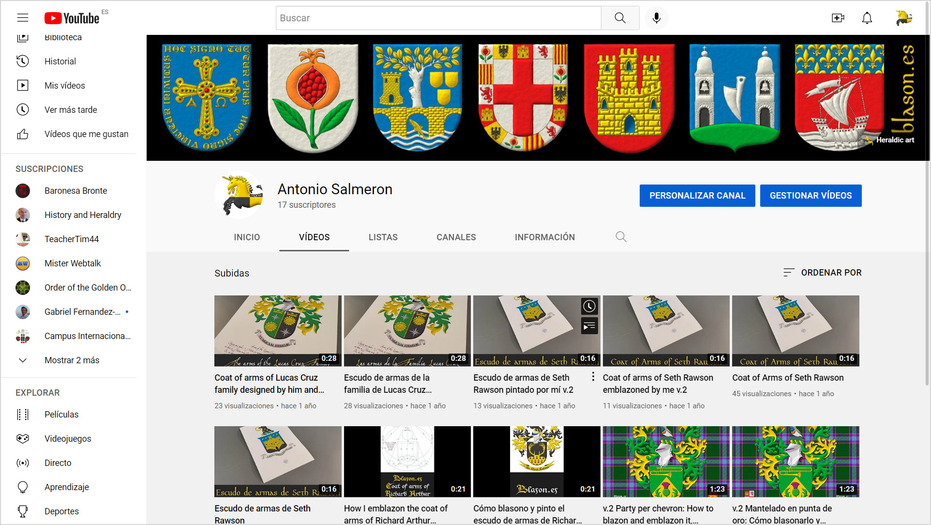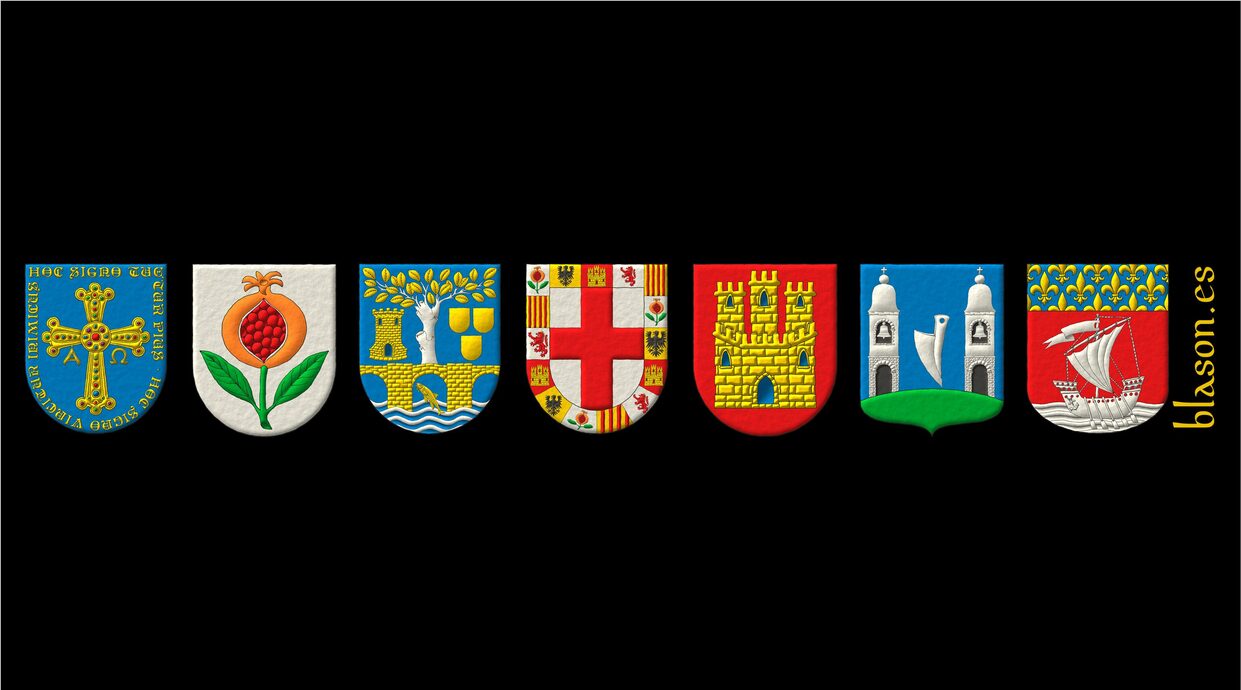Cross

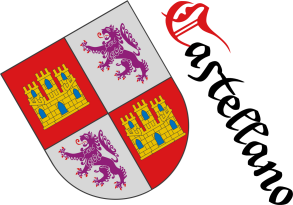
9 coats of arms in the ballroom
There is a series of nine coats of arms in the ballroom of the castle:
- Or, three Fleurs de lis Azure.
- Azure, a Bendsinister Or.
- Or, a Fleur de lis Azure.
- Azure, a Cross Or.
- Or, five Fleur de lis Azure in saltire.
- Azure, a Fess Or.
- Or, two Fleur de lis Azure in bend.
- Azure, a Saltire Or.
- Or, four Fleur de lis Azure.
There are so many Fleurs de lis that everyone, except the joker, calls it the «fleurdelisée» room. Nobody knows the reason why the joker says there is none, do you?
Think before you move the cursor or click on the following link and see the solution.
Categories: Riddle, Or, Azure, Fleur de lis, One, Two, Three, Four, Five, Bend sinister, Cross, Fess and Saltire.


9 coats of arms in the ballroom, solution
Categories: Riddle solution, Ogee, Outlined in sable, Freehand, Or, Azure, Fleur de lis, One, Two, Three, Four, Five, Bend sinister, Cross, Fess and Saltire.


Alarcon of Cantabria, lineage
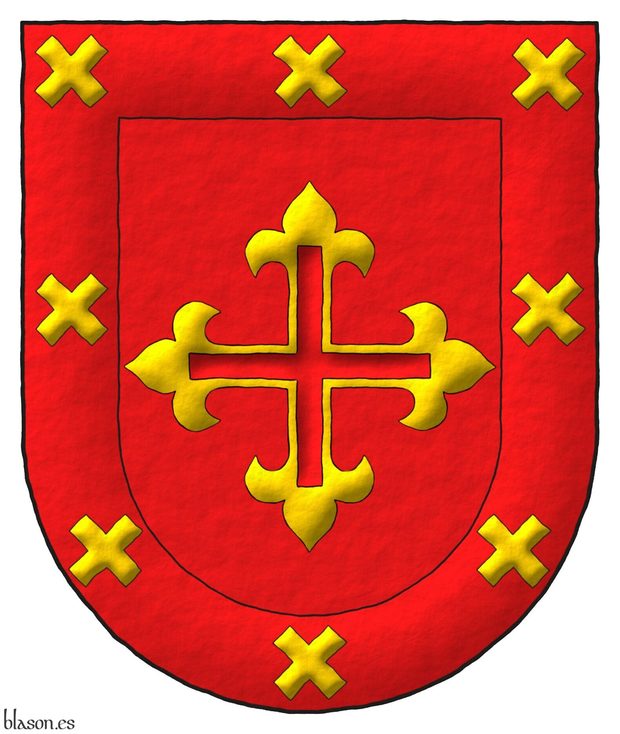
Gules, a cross flory voided Or; within a bordure Gules with eight saltires couped Or.
Escudo de gules, una cruz hueca flordelisada de oro; bordura de gules, ocho sotueres de oro.
Coat of arms painted by me, highlighted with lights and shadows, outlined in Sable, with a semi-circular external shape and with a freehand finishing.
Ancient arms of Alarcon of Cantabria emblazoned by me.
Blazon keywords: Argent, Sable, Or, Gules, Three, Cross, Flory, Voided, Bordure, Saltire and Couped.
Style keywords: Outlined in sable, Illuminated, Semi-circular and Freehand.
Classification: Personal, Interpreted, Boa and Coat of arms.
Bearer: Alarcon of Cantabria, lineage.


![Ver [Alcantara, Order of] en instituciones citadas. Fortaleza de oro y mazonada de sable.](../css/Fortaleza.Institucion.png)
Alcantara, Order of
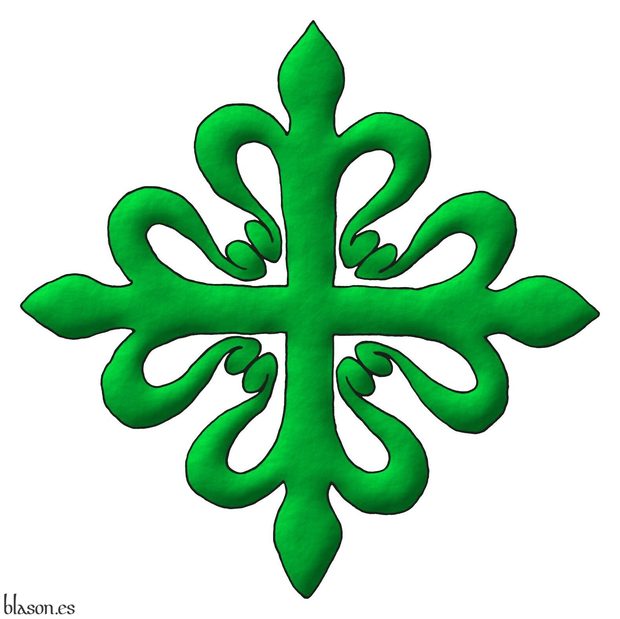
It was founded by Count Henry of Burgundy as a military and religious order, in the year 1093, in Beira Alta, Portugal, near the river Côa with the initial name of «Ordem de São Julião do Pereiro» ~ Order of Saint Julian of Pereiro.
In the year 1214, the defense of the city of Alcantara after its conquest was entrusted to the Order of Calatrava, but in 1218 the Calatravans relinquished it due to Alcantara being far from Calatrava.
To defend Alcantara, King Alfonso IX of León entrusted it to the new Order of the Knights of Saint Julian of Pereiro, requesting in return a certain level of dependency on the Order of Calatrava, which led the Knights of Saint Julian to adopt the Cistercian rule.
Once established in Alcantara, their original name referring to Saint Julian fell into disuse, and by 1253 there were already references to the «masters of the Order of Alcantara», with Saint Julian of Pereiro becoming the foundational center and a secondary commandery of the order.
On the origin and antiquity of the Military Order of Alcantara, and the form of its Commandery
[Avilés, J.; 1780b; treatise IV, chapter V, page 339] describes it as follows: «The Military Order, which we now call of Alcantara, was formerly that of Saint Julian of Pereiro, so named after the place where it was based, along the banks of the river Côa, in the Bishopric of Ciudad-Rodrigo, established in the year 1176 by King Ferdinand II of León, and confirmed in 1177 by Pope Alexander III. And the reason for changing its first name to the second, was because after the Knights of Calatrava had taken the City of Alcantara from the Moors and defended it bravely thereafter, they found it would be difficult to keep it, as their main house was very distant, from which the other Knights and reinforcements could not come whenever needed.».
[Avilés, J.; 1780b; treatise IV, chapter V, page 340] continues by telling us «They discussed this inconvenience with others they had at the time with the King of León, Don Alfonso IX, and it was resolved that the Master of Calatrava would give that town to the Knights of Pereiro so that they might defend it, as they did, under certain conditions in the year 1218, later performing marvels in its defense, earning through their fame and distinguished feats new graces from the Kings; and seeing how essential their residence was, the Knights of Pereiro moved to the town of Alcantara, establishing their Convent there, and thus transformed into Knights of Alcantara, who were previously Knights of Saint Julian of Pereiro».
Categories: Institution, Interpreted, Religious, Military, Illuminated, Outlined in sable, Freehand, Emblem, Cross of Alcantara, Cross couped and Cross.


Alfonso Sánchez de Perella, collage
Azure, a cross flory voided Argent; a bordure Gules charged with sixteen saltires couped Or.
Coat of arms emblazoned by me, highlighted with lights and shadows, contoured in Sable, with a semi-circular external shape and with a texturized finishing.
Alfonso Sánchez de Perella, first mayor of Burgos emblazoned by me. He appears as the [Cofradía de Santiago; Century XIV; 4th knight, 1st of the page 21 V], from this 14th century Book of the Brotherhood of Knights of Santiago de la Fuente. This was a brotherhood founded by the Burgos citizens at the time of King Alfonso XI of Castilla, 1311-1350. In the book, there are 14 saltires instead of 16, as it appears that one is missing on the sinister side of the base, and there are 4 in the chief instead of 5.
Blazon keywords: Azure, Argent, Gules, Or, One, Sixteen, Cross, Flory, Voided, Bordure, Saltire and Couped.
Style keywords: Outlined in sable, Illuminated and Semi-circular.
Classification: Personal, Interpreted, Boa and Coat of arms.
Bearer: Sánchez de Perella, Alfonso.


Arithmetic
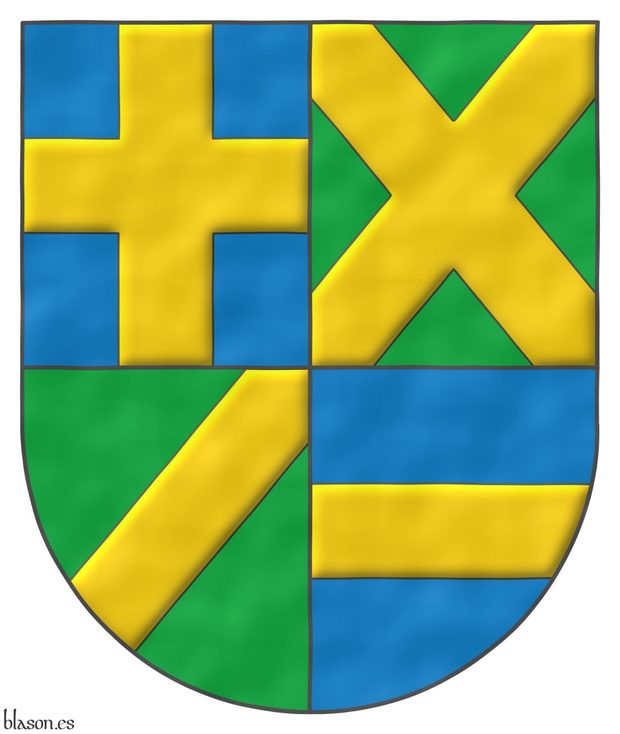
Quarterly: 1 Azure, a cross Or; 2 Vert, a saltire Or; 3 Vert, a bend sinister Or; 4 Azure, a fess Or.
Escudo cuartelado: 1o de azur, una cruz de oro; 2o de sinople, un sotuer de oro; 3o de sinople, una barra de oro; 4o de azur, una faja de oro.
Imaginary coat of arms that I have created featuring: a semicircular external shape; a field enamelled with flat azure and green inks; all pieces in metal Or, outlined in Sable and illuminated; and the entire design finished with a watercolor effect.
This coat of arms symbolizes the fundamental area of mathematical science, whose object of study is numbers and the elementary operations that can be performed with them: addition, subtraction, multiplication, and division.
Blazon keywords: Quarterly, Azure, Vert, Or, Cross, Saltire, Bend sinister and Fess.
Style keywords: Illuminated, Outlined in sable and Watercolor.
Classification: Created, Imaginary and Coat of arms.
Imaginary bearer: Arithmetic.


Bailleul, commune of
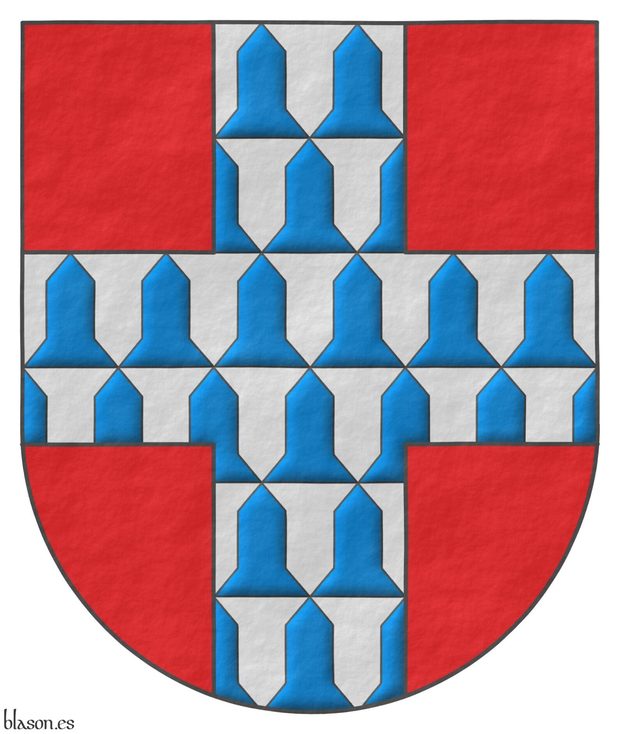
Gules, a cross vair.
Escudo de gules, una cruz de veros.
Coat of arms interpreted with: a semicircular (round) base; the field in flat tincture of Gules; the vair illuminated and outlined in Sable; and the whole with a roughened finish.
The commune of Bailleul is located in the district of Dunkirk, in the Nord department, in the Nord–Pas-de-Calais region of France.
The coat of arms of Bailleul, called «Belle» in Flemish, is similar to that of the heraldist Gonzalo Argote de Molina, differing in that the commune’s arms bear vair, while the heraldist’s arms bear rounded vair in the ancient style.
Blazon keywords: Without divisions, Gules, Argent, Azure, Cross and Vair.
Style keywords: Semi-circular, Illuminated, Outlined in sable and Rough.
Classification: Interpreted, Civic, Coat of arms and Kingdom of France.
Bearer: Bailleul, commune of.


![Ver [Calatrava, Order of] en instituciones citadas. Fortaleza de oro y mazonada de sable.](../css/Fortaleza.Institucion.png)
Calatrava, Order of
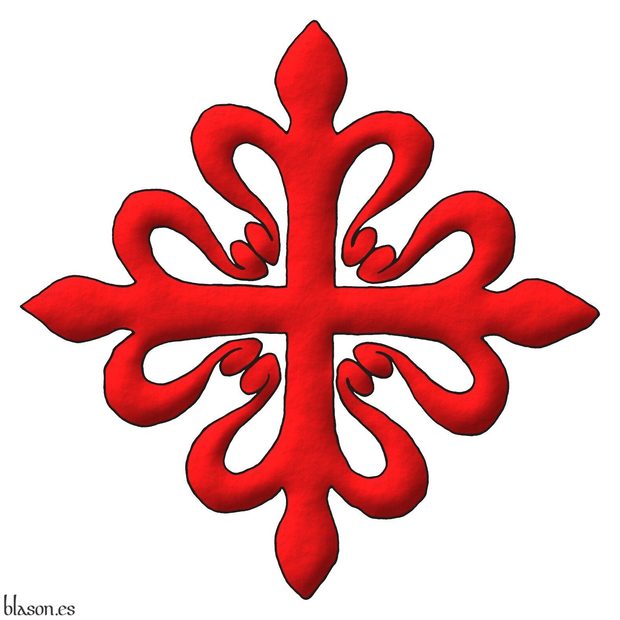
The Order of Chivalry of Calatrava is both military and religious, founded in the Kingdom of Castile during the 12th century by Abbot Raymond of Fitero.
The purpose of its foundation was the protection of the town of Calatrava la Vieja, which currently belongs to the municipality of Carrión de Calatrava in Ciudad Real. At the time of the order's foundation, it was an important city, in the middle valley of the river Guadiana and with a strategic position, as it was a necessary passage on the road from Toledo to Córdoba to Toledo and between the west and east of the Iberian Peninsula.
On the origin and antiquity of the Military Order of Calatrava, and the form of its Commandery
[Avilés, J.; 1780b; treatise IV, chapter IV, pages 334] writes «The Military Order of Calatrava was instituted by Don Sancho III, King of Castile (called the Desired), in the year 1158, while he was visiting his Kingdom; and being in Toledo with news of the great army that the Moors were gathering to besiege Calatrava la Vieja (which is called so today to distinguish it from the new one, which was founded later); and as the Templars, to whom this Fortress belonged, did not have sufficient power to resist such a large multitude, they handed it over to King Don Sancho himself so that he could take charge of it, as he did».
[Avilés, J.; 1780b; treatise IV, chapter IV, page 335] continues by telling us «The Abbot of Santa María de Fitero», near the river Pisuerga as he will indicate next, «of the Congregation of Cistercian, in the Bishopric of Palencia (which is a Monastery of St. Bernard, located on the river Pisuerga), named Don Raymond, and Friar Diego Velazquez, his subject Monk, who followed the Court, despite the difficulty of the enterprise, requested it from the King to defend it, which was granted, trusting in the virtue of the Abbot, and the strength of the Monk, who had previously been a great Knight in deeds of Arms, and very practiced in war».
[Avilés, J.; 1780b; treatise IV, chapter IV, page 336] continues «Seeing themselves in such an obligation, and that by themselves they could not fulfill it, they turned to Archbishop Don Juan (who was the fourth of Toledo) for help; and he, granting many indulgences in all his Archbishopric to those who, for themselves and for others, supplied the Place with provisions, in the same way as those who, unable to go due to old age or illness, helped with weapons, horses, and men; and having spread this news, so much help came to them, that when the Moors learned that the number of people exceeded twenty thousand men, they abandoned the conquest, returning to their homes: for this reason, the King ceded the Town of Calatrava to the Abbot of Fitero, and his successors, to defend it from the Moors from then on, confirmed later by King Alfonso IX, his son».
[Avilés, J.; 1780b; treatise IV, chapter IV, page 337] concludes «Having obtained this grace, Abbot Don Raymond brought the most suitable Monks from Fitero to Calatrava, and everything else that was necessary for living and for the defense of the Town and its land, which with the people inclined to war who remained, formed the Order of Chivalry of Calatrava, taking this name from the place where the institution was made, which in Arabic Calatrava means Castle».
Categories: Institution, Interpreted, Religious, Military, Illuminated, Outlined in sable, Freehand, Emblem, Cross of Calatrava, Cross couped and Cross.


Carlos Vidriales, certification, pages 6 and 7
Arms of Carlos Vidriales García Bustamante painted by me in the Certification of the King of Arms of Castile and Leon Alfonso de Ceballos-Escalera and Gila, Marquess of La Floresta, Viscount of Ayala and grand of Spain. The image shows the pages 6 and 7 of this certification.
Credits:
- Alfonso de Ceballos-Escalera y Gila is the author of the certification of arms.
- Antonio Salmerón y Cabañas is the author of the heraldic art for the certified coat of arms.
Categories: Certification, Heraldic document, Coat of arms, Interpreted, Personal, Semi-circular, Illuminated, Outlined in sable, Party per pale, Argent, Cross, Sable, Bordure, Motto, Or, Thirteen, Hurt, Hurt, torteau, pellet, pomme and golpe, Azure, Three, In pale, Four, Five, Chief, Fleur de lis, Lineage, Conjoined in fess, Decoration, Suspended and Base (lower 1/3).
Root: Vidriales García y Bustamante, Carlos.


Cavalry Regiment Alcantara, Laureate of Saint Ferdinand
Grand Laureate Cross of Saint Ferdinand.
Argent, a cross of Alcantara. Crest: A closed royal crown Or, with eight arches, visible five. Behind the shield the Laureate Grand Cross of Saint Ferdinand. Motto: «Hoec nubila tollunt obstantia sicut sol».
Escudo de plata, una cruz de Alcántara. Timbrado de una corona real cerrada. Acolada detrás del escudo la gran cruz laureada de San Fernando. Lema: «Hoec nubila tollunt obstantia sicut sol».
Coat of arms interpreted in the following manner: the shape of the shield is of a semicircular arch; the field is illuminated in metal Argent; the cross of Alcantara, the 4 swords and the 2 laurel branches are outlined in Sable and illuminated in Vert and Gules; the royal crown is closed, outlined in Sable and illuminated with the metal Or, Argent for the pearls, Azure and Or for the orb, Gules and Vert for the gems, Gules for the inner cloth, and Sable for the visible hollow at its base; and the whole has a iridescent finish.
Rif War, July 23, 1921, banks of the Igan River, North Africa
The Alcantara Regiment executed nine successive cavalry charges to protect the infantry's retreat, nine charges until they broke the enemy lines, outnumbering them. The last charge was on foot because all their horses were dead or exhausted. These heroic riders of Alcantara had fulfilled their duty of protecting the wounded infantry in their retreat to El Batel, but the price was appalling: of 691 riders, only 67 survived, and three months were necessary to recover hundreds of corpses.
For this reason, in 2012, the Alcántara Regiment was collectively awarded the Grand Laureate Cross of Saint Ferdinand.
Two lances behind the shield
Since 1987, the coat of arms of the cavalry regiments of the Spanish Army must carry two crossed lances accolade behind the shield. And indeed, this coat of arms of the Alcántara Cavalry Regiment has two lances behind the shield, but in my artistic heraldic interpretation, I did not paint them to avoid detracting from the prominence of the Laureate Cross.
Blazon keywords: Without divisions, Argent, Cross of Alcantara, Cross couped, Cross, Crest, Closed royal crown, Crown, Behind the shield, Four, Sword, Crosswise, Gules, Two, Branch, Laurel, Vert and Motto.
Style keywords: Semi-circular, Illuminated, Outlined in sable and Iridescent.
Classification: Interpreted, Military, Army and Navy and Coat of arms.
Bearer: Alcantara, Cavalry Regiment.


Cavalry Regiment Montesa, royal crown
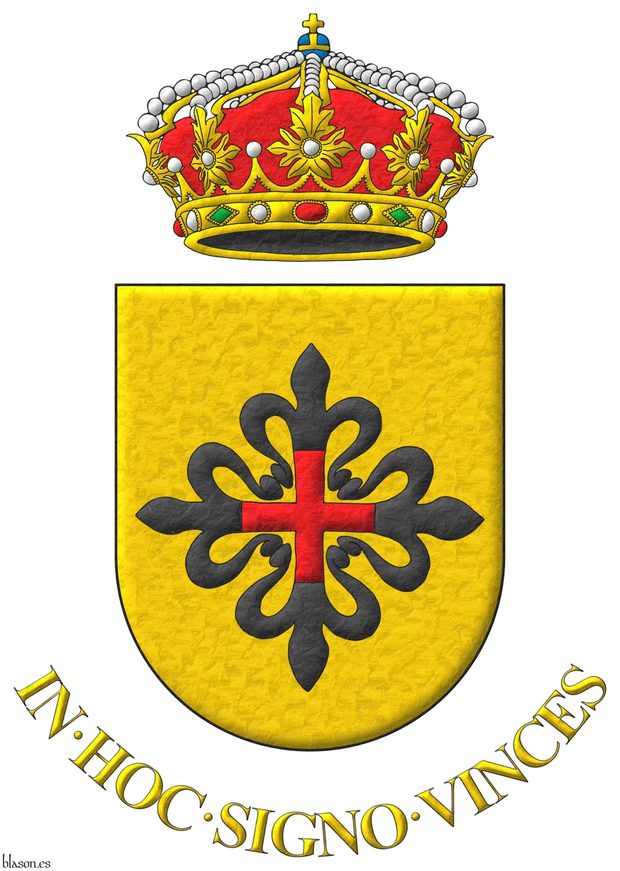
In this sign, you shall conquer.
Argent, a cross of Montesa. Crest: A closed royal crown Or, with eight arches, visible five. Motto: «In hoc signo vinces».
Escudo de oro, una cruz de Montesa. Timbrado de una corona real cerrada. Lema: «In hoc signo vinces».
Coat of arms interpreted as follows: the shape of the shield is a semi-circular arch; the field has been illuminated in metal Or; the cross of Montesa is outlined in Sable and illuminated in Sable and Gules; the royal crown is closed, outlined in Sable and illuminated the metal in Or, the pearls in Argent, the orb in Azure and Or, the gemstones in Gules and Vert, the inner cloth in Gules, and the visible hollow at its base in Sable; and the whole has a slightly beaten metal finish.
Regimental Motto
The Latin motto «In hoc signo vinces» is translated as «In this sign, you shall conquer».
Globus cruciger ~ Orb
It is called orb ~ «globus cruciger», the first in Spanish and the second in Latin, referring to the part of the royal crown, a jewel, or a jewel itself that recreates the shape of the globe topped with a cross.
Blazon keywords: Without divisions, Or, Cross of Montesa, Cross couped, Cross, Crest, Closed royal crown, Crown and Motto.
Style keywords: Semi-circular, Illuminated, Outlined in sable and Soft metal.
Classification: Interpreted, Military, Army and Navy and Coat of arms.
Bearer: Montesa, Cavalry Regiment.


![Ver [Coat of Arms of Ugnius Mikucionis in Twelve Lineages] en enlaces recomendados. Áncora de oro y la divisa enlace.](../css/Ancora.Enlace.png)
Coat of Arms of Ugnius Mikucionis in Twelve Lineages
Publication of my interpretation of the arms of Ugnius Mikucionis, on the blog Twelve Lineages of Soria with the article titled: The eminent heraldist Mr. Antonio Salmerón Cabañas interprets the coat of arms of Ugnius Mikucionis (Lithuania and Norway).
Blazon in Spanish by Alfonso de Ceballos-Escalera y Gila, Chronicler of Arms of Castile and León, from his certification of arms: «Vert, a Latin cross made of a wooden staff, raguly, from whose sinister flank issues a leafy branch that encircles the cross from above and entwines over its base, all Or. Crested with a steel helmet affronty, torse Or and Vert, with mantling Vert doubled Or. For crest, the same raguly Latin cross, branched and leafed, Or, placed before two wings Vert».
Blazon in English by The South African Bureau of Heraldry, from its certification of arms: «Vert, a wooden staff, its upper end terminating in a Latin cross, raguly, couped at random, issuant from its sinister nombril point a leaved offshoot encircling the cross, its end terminating and debruising the lower limb Or. Crest: In front of a pair of wings displayed Vert, a wooden staff issuant, its upper end terminating in a Latin cross, raguly, couped at random, issuant from its sinister nombril point a leaved offshoot encircling the cross, its end terminating and debruising the lower limb Or. Wreath and mantling: Vert and Or». I do not agree with the specification of the exact place of origin of the branch, the «nombril point» ~ «navel», because that point of origin does not distinguish this coat of arms from another where the branch could emerge at a different height, either closer or further from the point of the shield, and because it forces the artistic interpretation to either break the rule of fullness or to draw a curved branch in a panache shape to allow it to open before gaining height.
Note how in the Spanish certification of arms, by the Chronicler of Arms of Castile and León, this unnecessary nombril specification as the origin point of the branch is omitted.
The nombril is the exact crossing point of the vertical axis of symmetry of the shield with the lower edge of the bend.
Categories: Link, Vert, One, Cross, Raguly, Sinister, Or, Helm, Wreath, Mantling, Crest, Two, Wing and At the nombril.
Root: Twelve Lineages of Soria.


Crest and mantling of Brady Brim-DeForest
Party per chevron Gules and Argent, two acorns slipped Or and in base a fleur de lis Azure. Crest: Upon a helm befitting his degree, with a wreath Or and Sable, a demi-lion Or, armed and langued Azure, holding in its paws a swallow-tailed pennon Azure, charged with a cross patty Argent. Mantling: Gules doubled Argent.
Arms painted by me, highlighted with lights and shadows, outlined in Sable, with a double pointed outer contour and with a leather finishing.
Blazon keywords: Gules, Or, Argent, Azure, Two, One, Party per chevron, Acorn, Slipped, Base, Fleur de lis, Crest, Upon (wreath), Helm, Demi, Lion, Armed, Langued, Grasping, Paw, Charged, Cross and Patty.
Style keywords: Outlined in sable, Illuminated, Double pointed and Leather.
Classification: Personal, Interpreted, Boa, Coat of arms, Pennon and Flag.
Bearer: Brim-DeForest, Brady.


Crest and mantling of the Lord of South Clifton
Sable, a tyger rampant Argent; a bordure Argent charged with eight crosses crosslet fitchy Sable. Crest: Upon a helm affronty lined Gules, issuant from a crown of Knight, a cross patty Gules. Mantling: Sable doubled Argent.
Coat of arms emblazoned by me, illuminated with lights and shadows, contoured in Sable, with a pointed outer contour and with a watercolor finish.
Blazon keywords: Sable, Argent, Gules, One, Eight, Tyger, Rampant, Bordure, Charged, Cross crosslet fitchy, Crest, Upon (wreath), Helm, Affronty, Lined, Issuant, Crown of Knight, Crown, Cross, Patty, Mantling and Doubled.
Style keywords: Outlined in sable, Illuminated, Pointed and Watercolor.
Classification: Personal, Interpreted, Boa and Coat of arms.
Bearer: South Clifton, Lord of.


Crest, mantling and motto of Julio Hector Aspe
Azure, a trumpet bend sinisterwise Or, debruised by a fish haurient Argent, debruised by a sword bendwise point downwards Or, all between two fleurs de lis in fess Argent. Crest: Upon a helm lined Gules with a wreath Or and Azure, a paschal lamb regardant Argent, nimbed Or, supporting a staff Or, flying a flag Argent charged with a cross Gules. Mantling: Azure doubled Or. Motto: «Quis ut Deus».
Coat of arms designed by me, illuminated with lights and shadows, outlined in Sable, with an ogee triple-pointed external shape and with a watercolor finishing.
Blazon keywords: Azure, Argent, Or, Gules, Sable, One, Two, Trumpet, Bend sinisterwise, Debruised, Fish, Haurient, Sword, Point downwards, Between, Fleur de lis, In fess, Crest and mantling, Crest, Upon (wreath), Helm, Wreath, Paschal lamb, Regardant, Nimbed, Grasping, Shafted, Charged, Cross, Mantling and Motto.
Style keywords: Outlined in sable, Illuminated, Ogee Triple-Pointed and Watercolor.
Classification: Personal, Created, Boa, Coat of arms and Flag.
Bearer: Aspe, Julio Hector.


Cross potent, cross moline, and cross of Jerusalem, comparison
A Gules and Or comparison between cross potent, cross moline, and cross of Jerusalem
Blazon keywords: Gules, Or, Cross potent, Cross couped, Cross moline, Cross of Jerusalem and Cross.
Style keywords: Freehand, Outlined in sable and Illuminated.
Classification: Schema.


Crown of the city of Almeria
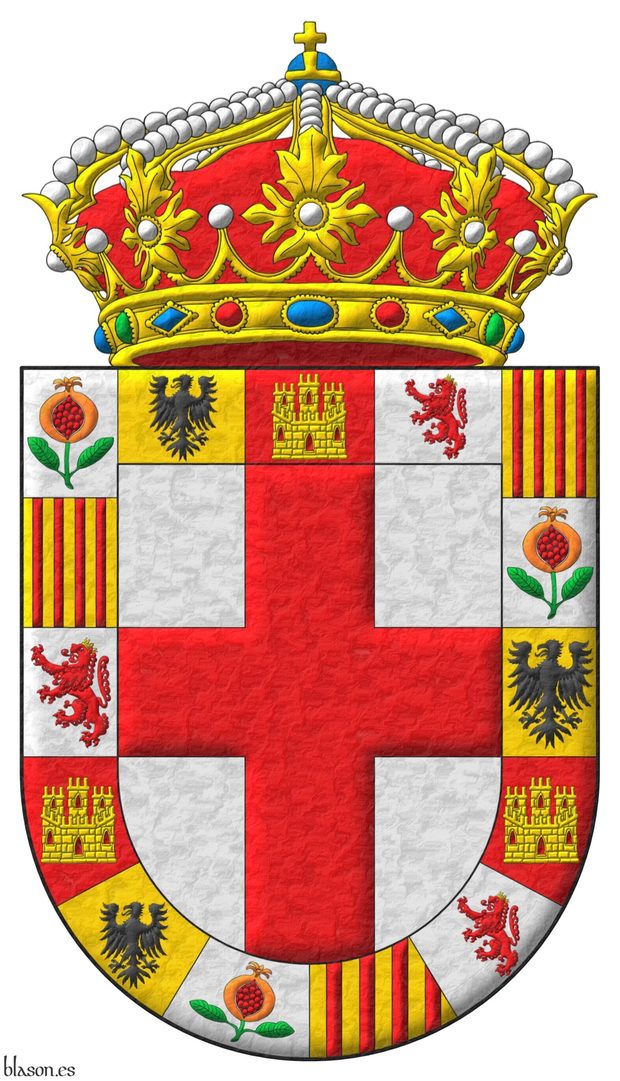
Argent, a cross Gules; a bordure compony of fifteen sections: 1, 6, and 11 Argent, a pomegranate seeded, slipped and leaved proper; 2, 7, and 12 Or, an eagle displayed Sable; 3, 8, and 13 Gules, a castle triple-towered Or, port and windows Gules, masoned Sable; 4, 9, and 14 Argent, a lion rampant Gules, crowned Or; 5, 10, and 15 Or, four pallets Gules. Crest: A closed royal crown.
Arms emblazoned by me, highlighted with lights and shadows, outlined in Sable, with a semi-circular outer contour and with a metal beaten finishing.
Coat of arms of the city of Almeria, Andalusia, emblazoned by me. The island of Alboran is geographically part of Africa, but politically it belongs to the city of Almeria. As a result, Almeria is one of the few cities in the world that spans two continents: Europe and Africa.
Blazon keywords: Argent, Gules, Or, Sable, Vert, One, Four, Fifteen, Cross, Bordure, Compony, Pomegranate, Slipped, Leaved, Proper, Eagle, Castle, Triple-towered, Port and windows, Masoned, Lion, Rampant, Crowned, Pallet, Closed royal crown and Crown.
Style keywords: Outlined in sable, Illuminated, Semi-circular and Metal beaten.
Classification: Civic, Interpreted, Boa and Coat of arms.
Bearer: Almeria, city of.


Family Simon-Faus
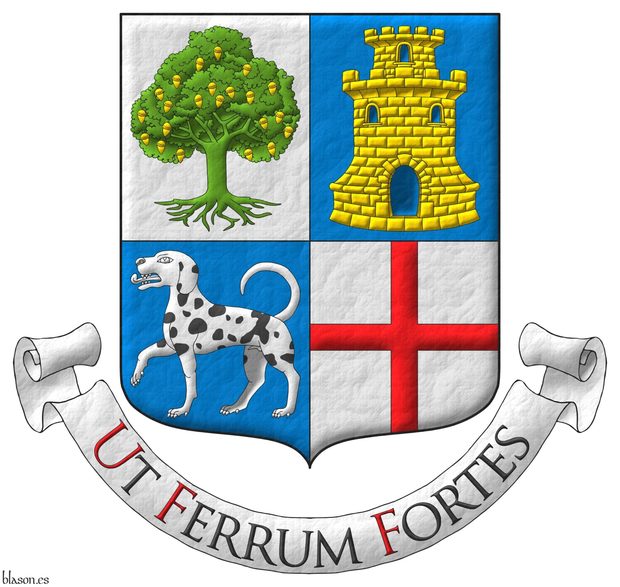
Quarterly: 1 Argent, an oak eradicated Vert, fructed Or; 2 Azure, a tower with a turret Or, port and windows Azure, masoned Sable; 3 Azure, a hound passant Argent, spotted Sable; 4 Argent, a cross Gules. Motto: «Ut Ferrum Fortes» Sable, with initial letters Gules, over a scroll Argent.
Escudo cuartelado: 1o de plata, una encina arrancada de sinople, frutada de oro, mazonado de sable; 2o de azur, una torre donjonada de oro, aclarada de azur; 3o de azur, un perro pasante de plata, moteado de sable; 4o de plata, una cruz de gules. Lema: «Ut Ferrum Fortes» de sable, con letras iniciales de gules, sobre una filacteria de plata.
Arms devised by me, highlighted with lights and shadows, outlined in Sable, with an ogee external shape and with a leather finishing.
Blazon keywords: Argent, Vert, Or, Azure, Sable, Gules, One, Quarterly, Oak, Tree, Eradicated, Fructed, With a turret, Port and windows, Masoned, Dog, Passant, Spotted, Cross and Motto.
Style keywords: Outlined in sable, Illuminated, Ogee and Leather.
Classification: Personal, Created, Boa and Coat of arms.
Bearer: Simon-Faus, family.


Five hurts and five pommes
Transform the blazon «Or» into «Or, five Pommes in saltire» and the blazon «Argent» into «Argent, five Hurts in saltire» moving the pommes and hurts through both metals, without breaking the rule of tinctures.
You can change one charge by another one, but only once.
For example, if you change «Sable, a Bend Argent» by «Sable, a Pale Argent», then the Pommes can arrive to «Or» blazon. However, this is not a solution, because the Hurts cannot walk to «Argent» blazon.
Think before you move the cursor or click on the following link and see the solution.
Categories: Riddle, Ogee, Outlined in sable, Freehand, Or, Argent, Vert, Azure, Gules, Sable, Hurt, torteau, pellet, pomme and golpe, Hurt, Pomme, In saltire, Fess, Saltire, Bend sinister, Cross, Pale and Bend.


Five hurts and five pommes, solution
For example, if you change «Azure, a Cross Argent» by «Azure, a Pall Argent», then the Pommes can arrive to «Or» blazon and the Hurts can arrive to «Argent» blazon. You can view both paths azure and vert in the following image.
Other solution is to change «Azure, a Cross Argent» by «Azure, a Bordure Argent».
Categories: Riddle solution, Ogee, Outlined in sable, Freehand, Or, Argent, Vert, Azure, Gules, Sable, Hurt, torteau, pellet, pomme and golpe, Hurt, Pomme, In saltire, Fess, Saltire, Bend sinister, Cross, Pale, Bend and Pall.


Full achievement of Jean-Yves de Sainte Croix de la Sabliere
Azure, a cross ermine fimbriated Or, between four fleurs de lis Argent, each enfiled in a crown Or. Crest: Upon a helm befitting his degree, issuant from a crown of Baron, with a wreath Or and Azure, a falcon displayed, belled Azure, crowned Or, holding in its dexter talon an hourglass Or and in its sinister talon a fleur de lis Argent. Mantling: Azure doubled Or. Motto: «Per Crucem Triumphans» Sable, over a scroll Argent, doubled Gules. Supporters: Two lions rampant Or, langued Gules.
Coat of arms depicted by me, illuminated with lights and shadows, contoured in Sable, with a pointed outer contour and with a freehand finish.
G0128, Chief Herald of Arms of Malta's grant for the arms of Jean-Yves, de Sainte Croix de la Sabliere, UK. These arms have been emblazoned by me for such grant.
Blazon keywords: Azure, Or, Argent, Gules, One, Four, Cross, Ermine, Fimbriated, Between, Fleur de lis, Enfiled, Crown, Crest, Upon (wreath), Helm, Issuant, Crown of Baron, Above the shield, Wreath, Falcon, Belled, Crowned, Dexter, Talon, Hourglass, Sinister, Mantling, Doubled, Motto, Scroll, Supporter (animal), Supporter, Lion, Rampant and Langued.
Style keywords: Outlined in sable, Illuminated, Pointed and Freehand.
Classification: Personal, Interpreted, Boa and Coat of arms.
Bearer: Sainte Croix de la Sabliere, Jean-Yves de.


Full achievement of the Reverend John Muscat
Argent, a tree eradicated proper, in chief an escallop reversed Gules, between two flies pilewise proper. Crest: A galero Sable with two cords, one on each side, each with six tassels Gules. Motto: «No Fear In Love». Behind the shield, the cross of the Holy Sepulchre of Jerusalem. The shield is surrounded by the cross of a Knight Commander of the Holy Sepulchre of Jerusalem.
Arms interpreted by me, highlighted with lights and shadows, outlined in Sable, with a pointed outer contour and with a freehand finish.
G0117, Chief Herald of Arms of Malta's grant for the arms of the Reverend John Muscat, Honorary Monsignor of the Canon Chapter, Roman Catholic Cathedral of the Assumption, Gozo. These arms have been emblazoned by me for such grant.
Blazon keywords: Argent, Gules, One, Two, Six, Tree, Eradicated, Proper, In chief, Escallop, Between, Fly, Pilewise, Crest, Galero, Cord, Tassel, Motto, Behind the shield, Cross, Surrounded and Decoration.
Style keywords: Outlined in sable, Illuminated, Pointed and Freehand.
Classification: Religious, Interpreted, Boa and Coat of arms.
Bearer: Muscat, John.


Gonzalo Argote de Molina
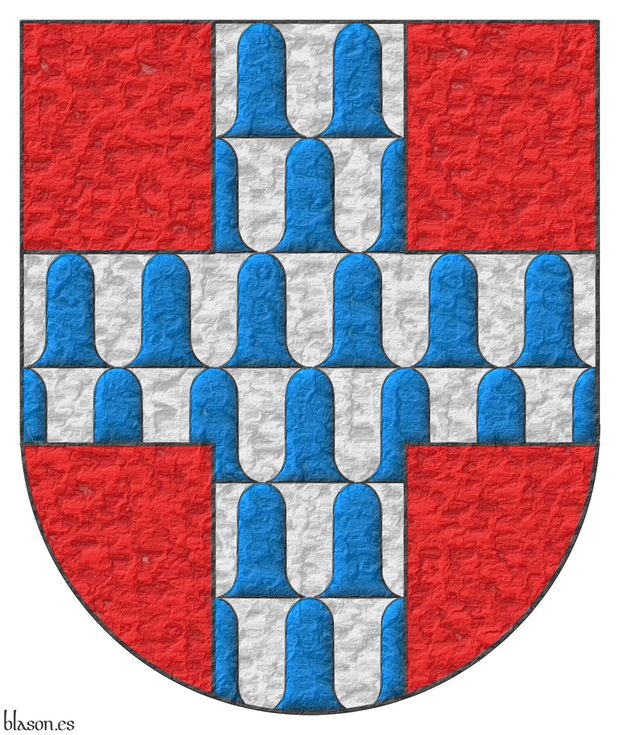
Gules, a cross vair ancient.
Escudo de gules, una cruz de veros antiguos.
Coat of arms that I have interpreted as follows: the shield has a semicircular (round) base; the field is in flat tincture of Gules; the vair ancient, rounded in the old style, are outlined in Sable and illuminated; and the whole has a raised-stroke drawing.
The coat of arms of the commune of Bailleul is very similar to this coat of arms, with the difference that it is of regular vair instead of ancient, rounded vair, like that borne by Gonzalo Argote de Molina.
Blazon keywords: Without divisions, Gules, Argent, Azure, Cross and Vair ancient.
Style keywords: Semi-circular, Illuminated, Outlined in sable and Metal beaten.
Classification: Interpreted, Personal, Coat of arms and Heraldry and heralds.
Bearer: Argote de Molina, Gonzalo.


Heikki Halkosaari, plain tincture
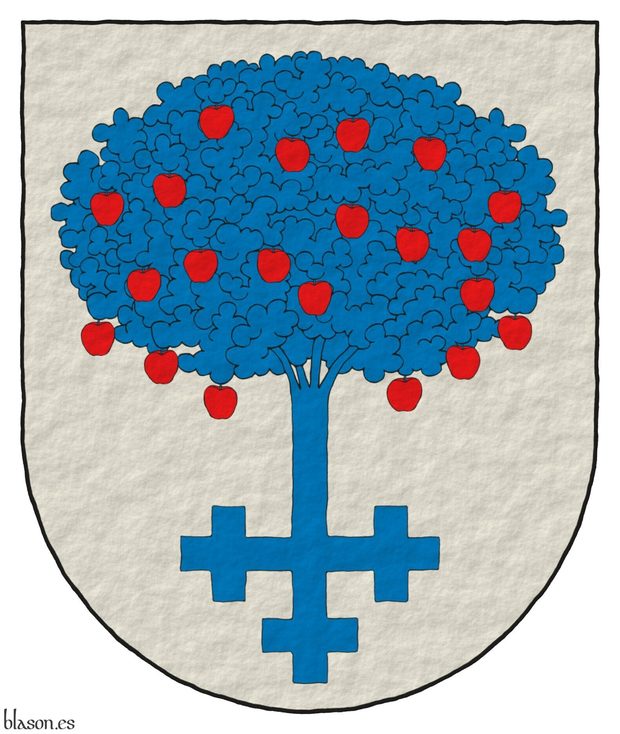
Argent, an apple tree, the base of its trunk forming a cross crosslet Azure, fructed Gules.
Arms interpreted by me, in flat tinctures, outlined in Sable, with a semi-circular outer contour and with a texturized finishing.
The coat of arms of Heikki Halkosaari, Finland, emblazoned by me.
Blazon keywords: Argent, Azure, Gules, One, Apple tree, Base, Trunk, Cross, Crosslet, Cross couped and Fructed.
Style keywords: Outlined in sable, Plain tincture and Semi-circular.
Classification: Personal, Interpreted, Boa and Coat of arms.
Bearer: Halkosaari, Heikki.


ISCH Certification for Tomasz Arkadiusz Grzeszkowiak
The Commoners' Certification of Arms for Tomasz Arkadiusz Grzeszkowiak, arms designed by Tomasz Steifer and emblazoned by me.
Gules, a base enarched Vert, overall a cross patty fitchy Or, piercing in base the head of a serpent nowed and facing sinister Sable, langued Gules. Crest: Upon a helm affronty, with a wreath Sable and Gules, in a front of three ostrich feathers alternately Sable and Gules a paschal lamb Argent, haloed Or and Gules, supporting a staff Or, flying a banner Argent charged with a cross Gules. Mantling: Gules doubled Sable. Motto: «Amor vincit omnia»
In the blazon of this certification, I wrote the expression «a Base enarched Vert», it is correct. But the expression «a Mount Vert» it is also possible. In the original expression in the Polish blazon is «na zielonym wzgórkuon» ~ «the green hill».
Blazon keywords: Without divisions, Gules, One, Mount, Vert, Issuant from base, Overall, Cross patty fitchy, Cross couped, Piercing, Head, Serpent, Nowed, Facing sinister, Sable, Langued, Helm, Affronty, Two, Mantling, Doubled, Wreath, Three, Quill, Alternately, Debruised, Paschal lamb, Argent, Nimbed, Or, Grasping, Shafted, Charged, Cross and Motto.
Classification: Interpreted, Personal, Certification, Heraldic document and Flag.
Bearer: Grzeszkowiak, Tomasz Arkadiusz.


Jamilena
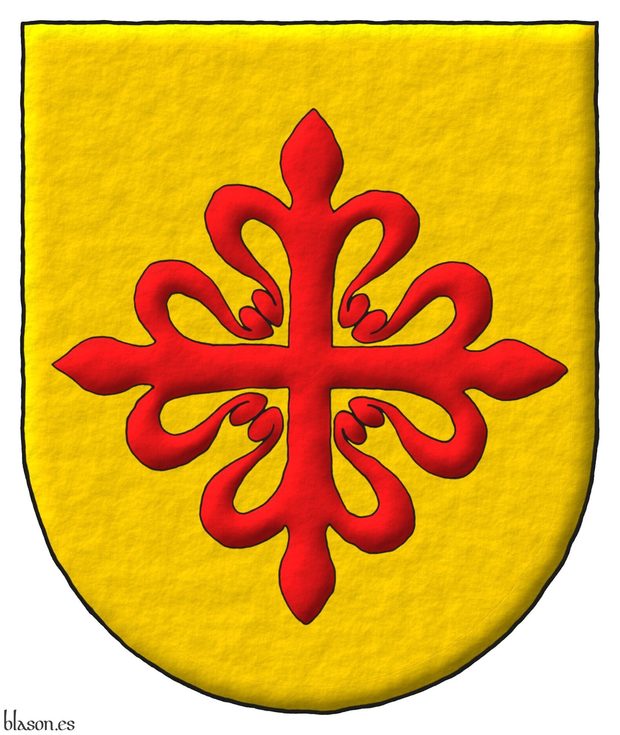
Coat of arms of the municipality of Jamilena, province of Jaén.
Or, a cross of Calatrava.
Escudo de oro, una cruz de Calatrava.
Coat of arms interpreted as follows: the shield's shape is a semicircular arch; the field is illuminated in metal Or; the cross of Calatrava is outlined in Sable and illuminated in Gules; and the entire piece has a rough line finish.
Blazon keywords: Without divisions, Or, Cross of Calatrava, Cross couped and Cross.
Style keywords: Semi-circular, Illuminated, Outlined in sable and Freehand.
Classification: Interpreted, Civic and Coat of arms.
Bearer: Jamilena.


McMillan Bell of Auchinreoch, Andrew Ronald
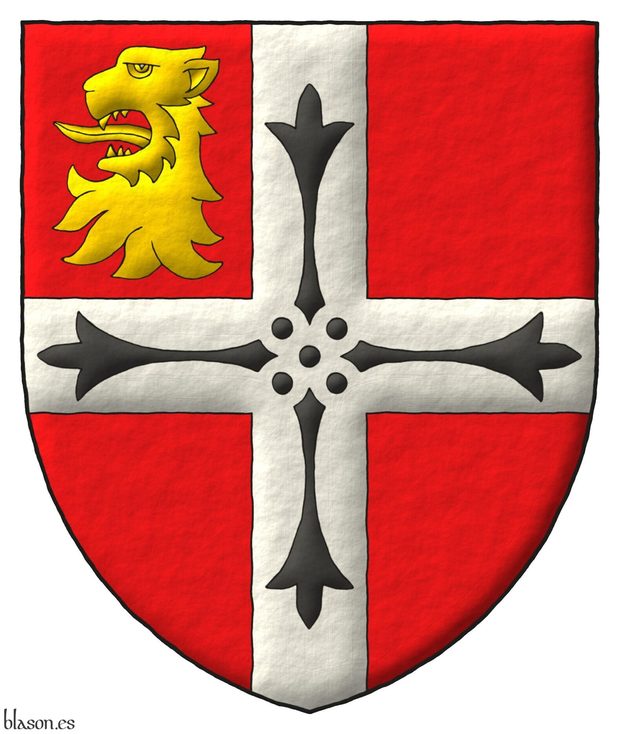
Gules, a cross Argent charged with four ermine spots in cross Sable, in the dexter of the chief a lion’s head erased Or.
Escudo de gules, una cruz de plata cargada de cuatro colas de armiño en cruz, en la diestra del jefe una cabeza de león arrancada de oro.
Arms interpreted by me, highlighted with lights and shadows, outlined in Sable, with a pointed external shape and with a freehand finish.
G0116, Chief Herald of Arms of Malta's grant for the arms of Andrew Ronald McMillan Bell of Auchinreoch, United Kingdom. These arms have been emblazoned by me for such grant.
Blazon keywords: Gules, Argent, Sable, Or, One, Four, Cross, Charged, Ermine, In cross, Dexter, Chief, Lion, Head and Erased.
Style keywords: Outlined in sable, Illuminated, Pointed and Freehand.
Classification: Personal, Interpreted, Boa and Coat of arms.
Bearer: McMillan Bell of Auchinreoch, Andrew Ronald.


![Ver [Montesa, Order of] en instituciones citadas. Fortaleza de oro y mazonada de sable.](../css/Fortaleza.Institucion.png)
Montesa, Order of
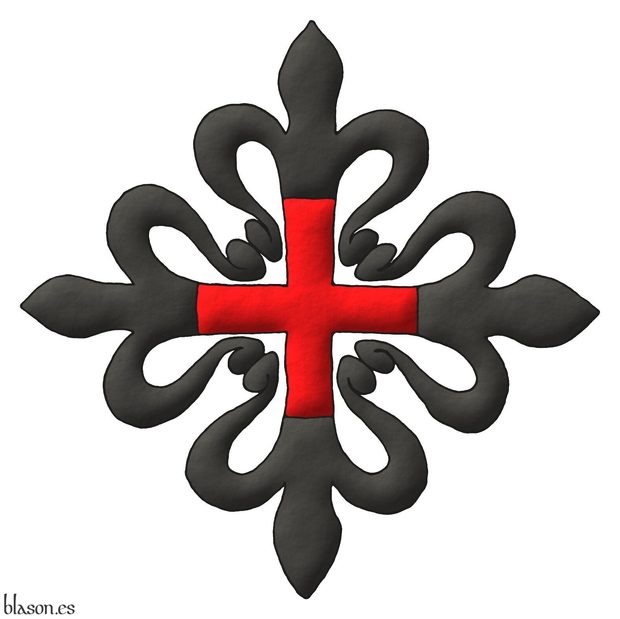
The Order of Saint Mary of Montesa and Saint George of Alfama, known as the Order of Montesa, was founded in the 14th century by the King of Aragon, James, as a military and religious order, to which he donated a castle in Valencia from which they took their name.
To endow the new Order of Montesa, the assets of the Order of the Templars, dissolved by Pope Clement V, were used. This is recounted by [Avilés, J.; 1780b; page 342] writing that Montesa was created «from the incomes and ruin of the Templars; as their Order was being extinguished, at the request of the Kings, so that said incomes would not leave the Kingdom.».
The order established within the Castle of Montesa, which previously belonged to the Templars, their convent and church of the Order, the palace of their Master, their barracks for fighting men, being able to form up to a couple of thousand of them in their parade ground. Their first Master, for 70 days since he died just over two months after his appointment, was Guillermo de Eril.
The origin and antiquity of the Military Order of Montesa, and the form of its Encomienda.
[Avilés, J.; 1780b; treatise IV, chapter VI, page 341] describes it as follows «The Military Order of Montesa was instituted in the year 1317 by the King of Aragon, Don Jaime II, and confirmed in the same year by Pope John XXII.».
Categories: Institution, Interpreted, Religious, Military, Illuminated, Outlined in sable, Freehand, Emblem, Cross of Montesa, Cross couped and Cross.


o-XI, heraldic document
Heraldic document, 2 pages.
The pages have a heraldic frame with the elements of his coat of arms.
The motto, which is the beginning of the Gospel of Saint John, can be seen in [Cnut Gospels; 1020; folio 111].
Blazon keywords: Quarterly, Sable, Or, One, Letter, Two, Wolf, Passant, In pale, Number, Gules, Argent, Azure, Crest and mantling, Helm, Mantling, Wreath, Crest, On, Charged, Disordered, Cross, Cross of Burgundy, Cross couped, Book, Open, Motto, Scroll and Fimbriated.
Classification: Created, Personal, Catalogue, Heraldic document and Frame.
Bearer: Salmerón Cabañas, Antonio.


Order of Santiago, emblem
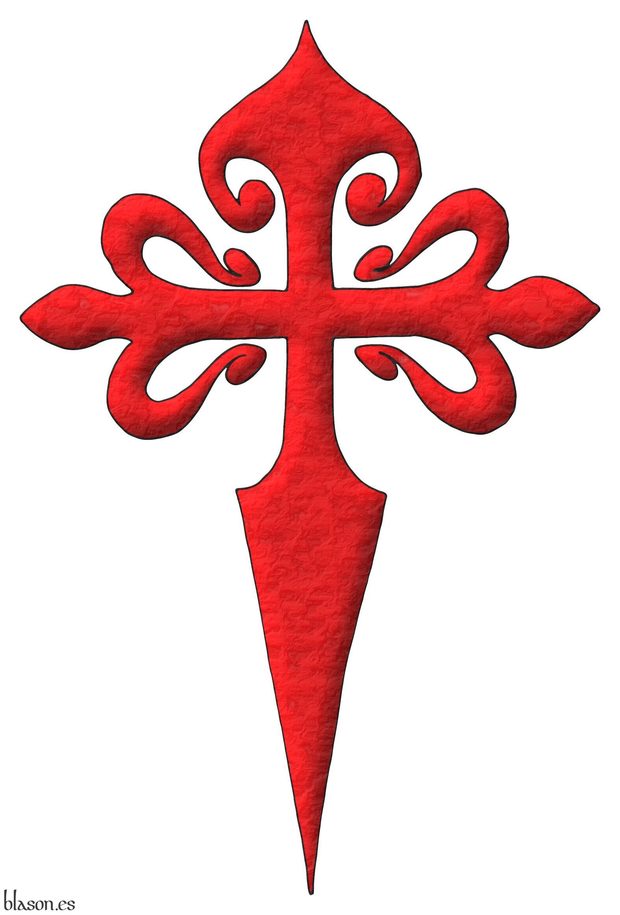
Order of Chivalry of Santiago
A cross of Saint James.
Una cruz de Santiago.
Interpretation of the emblem of the order with: its cross outlined in Sable, illuminated in Gules; and a heavily hammered metal finish.
The Royal Council of the Orders of Chivalry of Santiago, Calatrava, Alcantara, and Montesa, in its historical account of the foundation of the Order of Santiago, describes three different points of view:
- The one presented by tradition, which establishes it in 844, after the battle of Clavijo, when fourteen knights led by the Field Master Don Sancho Martínez de Tejada requested permission from Don Ramiro I, king of Asturias between the years 842 and 850, to found it. This traditional view is the one recorded in [Avilés, J.; 1780b; treatise IV, chapter II, page 325] when discussing the origin of the «Military Order of Santiago of the Sword».
- The perspective of historians like Claudio Sánchez Albornoz or Américo Castro, who question the earlier date. Furthermore, [Sánchez Albornoz, C.; 1965; pages 94-136], as cited in [Domínguez García, J.; 2008; pages 69-70], proposes that the actual battle of Clavijo occurred later, in the year 859, and that Ramiro I did not participate, but rather it was a conflict between King Ordoño I and the Moor Muza.
- The view of historians who, based on the statutes of the order found in the Monastery of Uclés, which was the residence of the Master of the Order of Santiago, and the Latin in which they are written, believe that the foundation could indeed date back to the reign of Don Ramiro I.
Emblem
Regarding the emblem of the Order of Chivalry of Santiago, [Avilés, J.; 1780b; treatise IV, chapter II, page 328, plate 25, figure 100] states «the Commandery of this Order was always a red Sword» (gules ~ red), «in the form of a Cross, just as the guards of the ancient Swords that its Knights and Commanders carried on their white Mantles, and today also on the chest in the same manner, hanging from a red ribbon on a gold medal; that is, in a field of Or, a Cross of Gules».
Blazon keywords: Cross of Saint James, Cross couped and Cross.
Style keywords: Illuminated, Outlined in sable and Soft metal.
Classification: Interpreted, Religious, Military and Emblem.
Bearer: Santiago, Order of.


Our Lady of Mercy, Order of
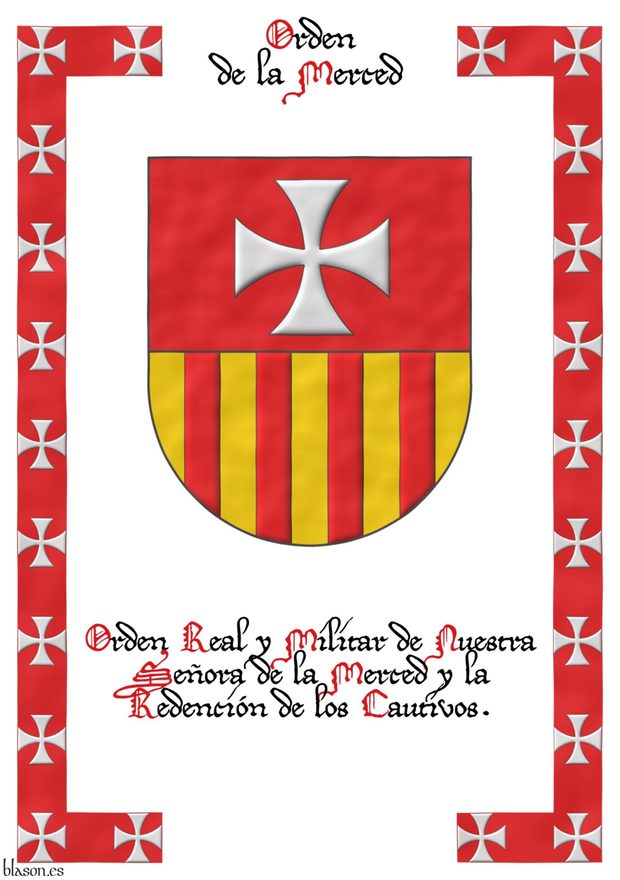
Royal and Military Order of Our Lady of Mercy and the Redemption of Captives.
Party per fess: 1 Gules, a cross patty Argent; 2 Or, four pallets Gules.
Escudo cortado: 1o de gules, una cruz patada de plata; 2o de oro, cuatro palos de gules.
Existing coat of arms which has been interpreted by me with the following characteristics: the mouth of the shield ends in a semicircular arch shape; the field has been enameled with flat tinctures of Gules color and Or metal; the cross patty and the pales are illuminated with Argent metal and Gules color; the whole has received a watercolor finish; and all within a Gules frame with 22 cross patties Argent, to which the name of its owner and blazon written in Sable and Gules tinctures is added.
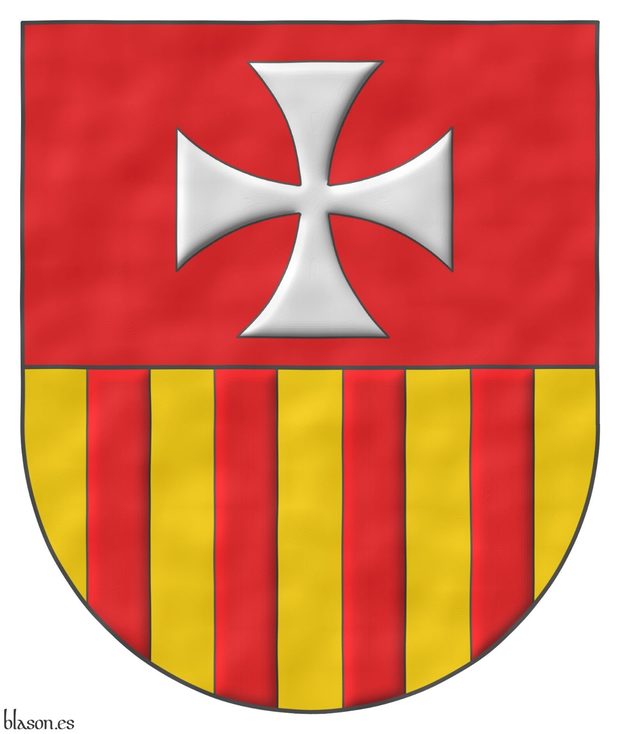
In [Medél, R.; 1846; plate 35, illustration 7] can be seen his interpretation of the coat of arms of the Order of Mercy.
The 2nd coat of arms of the Order of Mercy also illustrating this article is the same as the one included within the frame that appears in the 1st illustration of this article.
Another way to write the blazon of the coat of arms of the Order of Mercy could be the following, which simplifies the description of the 2nd quarter by saying that they are the arms of Aragon:
Party per fess: 1 Gules, a cross patty Argent; and 2 Or, four pallets Gules.
This coat of arms has been classified within the category called religious heraldry.
Blazon keywords: Party per fess, Gules, Or, Argent, Cross, One, Cross patty, Cross couped and Pale.
Style keywords: Semi-circular, Illuminated, Outlined in sable and Watercolor.
Classification: Interpreted, Religious and Frame.
Bearer: Our Lady of Mercy, Order of.


Province of Cáceres with Cross of Alcántara
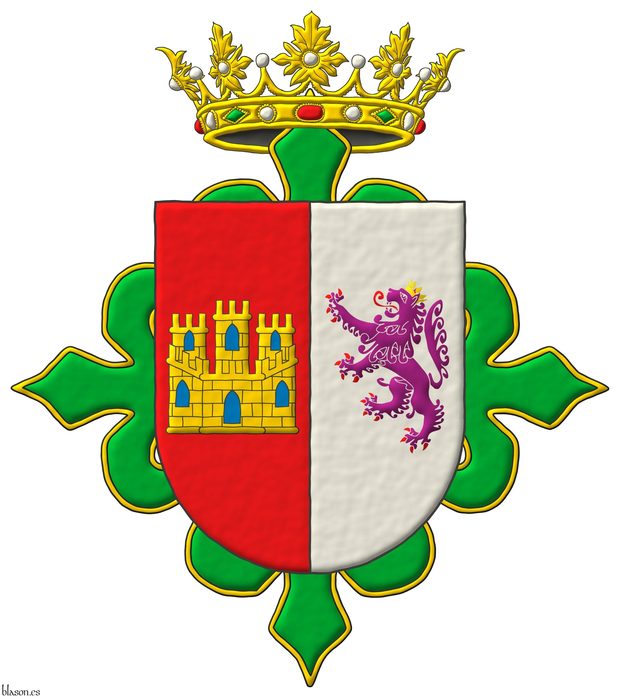
Party per pale: 1 Gules, a castle triple towered Or, port and windows Azure, masoned Sable; 2 Argent, a lion rampant Purpure, armed and langued Gules, crowned Or. Crest: An open royal crown. Behind the shield a cross of Alcantara.
Escudo partido: 1o de gules, un castillo de oro, aclarado de azur, mazonado de sable; 2o de plata, un león rampante de púrpura, armado y lampasado de gules, coronado de oro. Timbrado de una corona real abierta. Acolada detrás del escudo una cruz de Alcántara.
Civic coat of arms interpreted by me as follows: the shield of arms has a semicircular (round) base; the quarters are enameled and illuminated in the tinctures Argent and Gules; the castle, the lion, the Cross of Alcántara and the crown are illuminated; the lion and its crown are outlined in the colour of the field; the open royal crown, the Cross of Alcántara and the castle are outlined in Sable; the Cross of Alcántara is fimbriated Or; and the whole has a watercolor finish.
In [Medél, R.; 1846; plate 35, illustration 5] one can see his interpretation of the Cross of Alcántara.
Blazon keywords: Argent, Purpure, Gules, Or, Azure, Party per pale, Castle, Lion, Port and windows, Masoned, Rampant, Armed, Langued, Crowned, Crest and mantling, Crown, Open royal crown, Behind the shield, Cross, Cross of Alcantara and Cross couped.
Style keywords: Semi-circular, Illuminated and Watercolor.
Classification: Interpreted, Civic and Coat of arms.
Bearer: Cáceres, Province of.


Rivas of Aragon, lineage
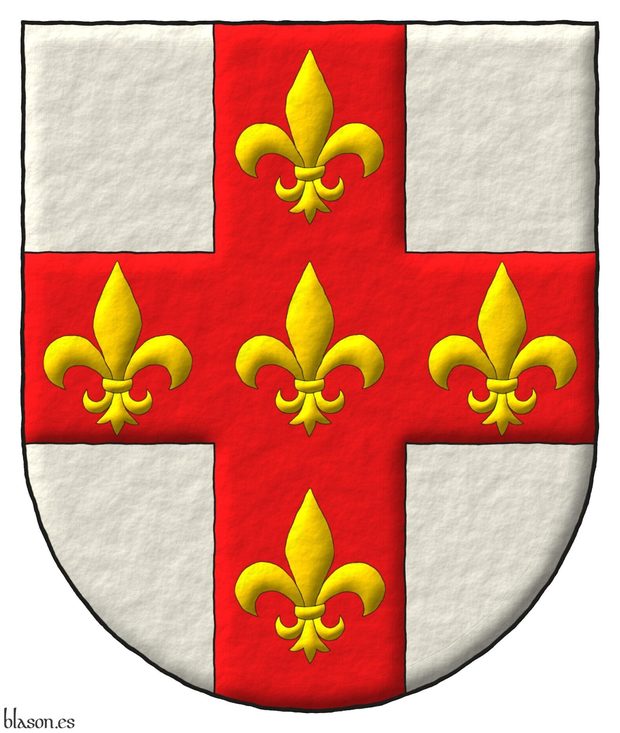
Argent, on a cross Gules five fleurs de lis Or.
Escudo de oro, una cruz de gules cargada de cinco flores de lis de oro.
Arms depicted by me, illuminated with lights and shadows, contoured in Sable, with a semi-circular outer contour and with a freehand finish.
Ancient arms of the lineage Rivas of Aragon emblazoned by me. Alternative blazon: «Argent, a cross Gules charged with five fleurs de lis Or».
Blazon keywords: Argent, Gules, Or, One, Five, Cross, Charged and Fleur de lis.
Style keywords: Outlined in sable, Illuminated, Semi-circular and Freehand.
Classification: Personal, Lineage, Interpreted, Boa and Coat of arms.
Bearer: Rivas of Aragon, lineage.


Robert George Alexander Balchin
Quarterly: 1 and 4 Vert, a crescent within eight mullets in lozenge Or; 2 and 3 Azure, a chain fesswise throughout between three fleurs de lis, 2 and 1, all the links and fleurs de lis per pale Or and Argent; an inescutcheon Azure, bearing a crown of count, charged with an eagle displayed within a bordure Or. Crest: A crown of Baron. Behind the shield the cross of a Knight of Justice of the Most Venerable Order of the Hospital of Saint John of Jerusalem.
Coat of arms emblazoned by me with a pointed shape, illuminated, and with a watercolor finishing.
G0067, Chief Herald of Malta's grant of Robert George Alexander Balchin's arms, whose full achievement has been emblazoned by me for such grant.
Blazon keywords: Quarterly, Vert, One, Crescent, Eight, Mullet, In lozenge, Or, Azure, Chain, Fesswise, Throughout, Between, Three, Fleur de lis, Ordered, Party per pale, Argent, Inescutcheon, Crest and mantling, Crown of Count, Crown, Charged, Eagle, Bordure, Crown of Baron, Behind the shield and Cross.
Style keywords: Outlined in sable, Illuminated, Watercolor and Pointed.
Classification: Personal, Interpreted and Coat of arms.
Bearer: Balchin, Robert George Alexander.


Royal Council of the Orders of Chivalry, emblem
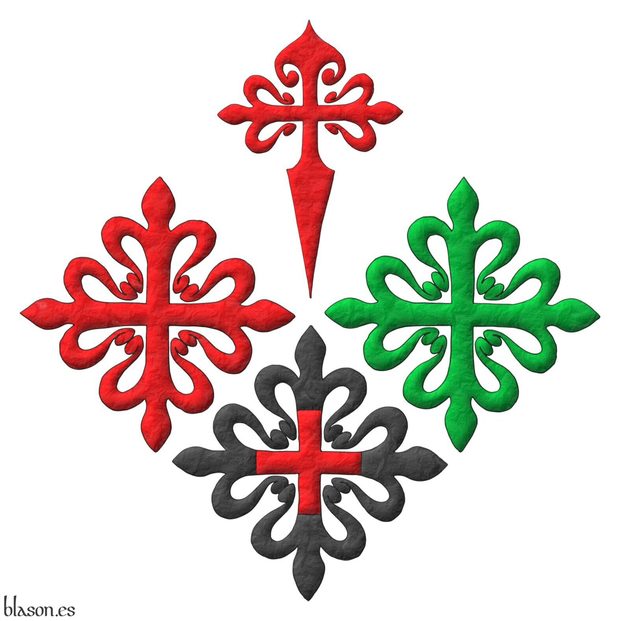
Royal Council of the Orders of Chivalry, of Santiago, Calatrava, Alcantara, and Montesa.
Emblem quarterly per saltire: 1, a cross of Saint James; 2, a cross of Calatrava; 3, a cross of Alcantara; 4, a cross of Montesa.
Emblema cuartelado en sotuer: 1o, una cruz de Santiago; 2o, una cruz de Calatrava; 3o, una cruz de Alcántara; 4o, una cruz de Montesa.
Interpretation of the emblem of the Royal Council with: its four crosses outlined in Sable, illuminated in Gules, Vert, and Sable; and a heavily hammered metal finish.
There is another version of this emblem of the Royal Council with the crosses of its four orders of Santiago, Calatrava, Alcantara, and Montesa outlined in Or instead of Sable.
Blazon keywords: Cross, Quarterly per saltire, Cross of Saint James, Cross couped, Cross of Calatrava, Cross of Alcantara and Cross of Montesa.
Style keywords: Illuminated, Outlined in sable and Freehand.
Classification: Interpreted, Socioeconomic and Emblem.
Bearer: Royal Council of the Orders of Chivalry.


Scheme with a fess and a cross
Proportions of the cross and its similarity with the fess.
This schema shows two coats of arms, the first with the proportion scheme of a fess, the second with the proportion scheme of a cross, and allows us to observe the common proportions between a fess and a cross.
Blazon keywords: Without divisions, Fess and Cross.
Style keywords: Semi-circular.
Classification: Schema and Coat of arms.
Bearer: Savoy, Duchy of.


Scheme with a pale and a cross
Proportions of the cross and its similarity with the pale.
This schema shows two coats of arms, the first with the proportion scheme of a pale, the second with the proportion scheme of a cross, and allows us to observe the common proportions between a pale and a cross.
Blazon keywords: Without divisions, Pale and Cross.
Style keywords: Semi-circular.
Classification: Schema and Coat of arms.
Bearer: Saboya, Ducado de.


Standard of Tim Wilkins
Structure of this standard:
- Argent, a cross gules.
- The 1st line of his motto.
- His coat of arms.
- The 2nd line of his motto.
- His badge.
Blazon keywords: Cross, Gules, Motto, Party per bend sinister, Or, Surmounted, Gauntlet, Sable, Palewise, Peacock, In his splendour and Proper.
Classification: Personal, Interpreted, Standard and Flag.
Bearer: Wilkins, Tim.


Stuart, John
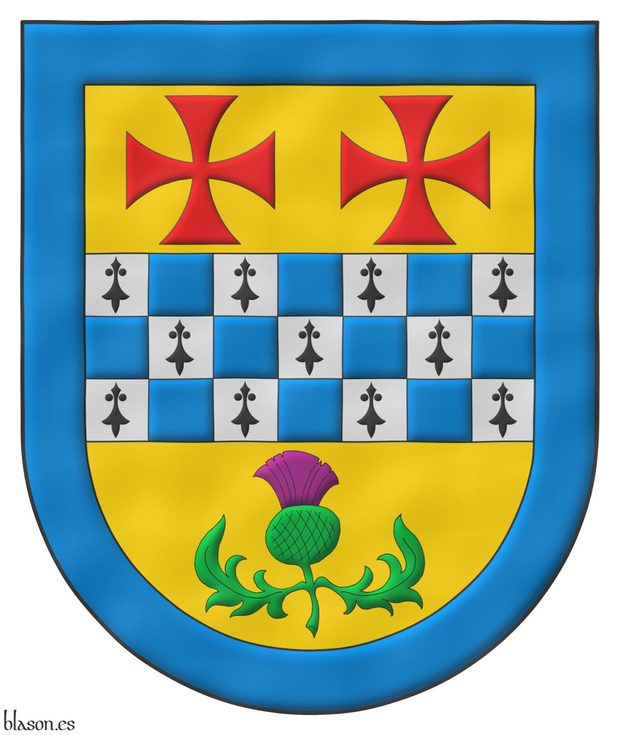
Or, a fess chequey Argent, charged with an ermine spot, and Azure, between in chief two cross patty Gules, in base a thistle proper; a diminished bordure Azure.
Escudo de oro, una faja ajedrezada de plata, cargada de una cola de armiño, y azur, acompañada en jefe de dos cruces patadas de gules, en base de un cardo al natural; una filiera de azur.
Coat of arms painted by me, highlighted with lights and shadows, outlined in Sable, with a semi-circular outer contour and with a watercolor finish.
Coat of arms of Reverend John Stuart, XVIII century, emblazoned by me.
Blazon keywords: Or, Argent, Azure, One, Three, Nine, Two, Fess, Chequey, Charged, Ermine spot, Between, In chief, Cross, Patty, In base, Thistle, Proper and Diminished bordure.
Style keywords: Outlined in sable, Illuminated, Semi-circular and Watercolor.
Classification: Personal, Interpreted, Boa and Coat of arms.
Bearer: Stuart, John.


Supporters, crest and motto of Nick Allen Rica II
Or, on a chevron, between three crosses flory Gules, three crescents Argent. Crest: Upon a helm, with a wreath Or and Gules, a pomegranate Proper, seeded Gules, slipped and leaved Vert. Mantling: Gules doubled Or. Supporters: Two Lions rampant Or, langued and armed Gules. Motto: «Fides et pietas».
Blazon keywords: Or, One, Chevron, Gules, Charged, Three, Crescent, Argent, Between, Cross, Flory, Crest and mantling, Helm, Mantling, Wreath, Crest, Pomegranate, Proper, Slipped, Leaved, Vert, Supporter (animal), Supporter, Two, Lion, Rampant, Langued, Armed and Motto.
Style keywords: Outlined in sable, Pointed, Illuminated and Rough.
Classification: Personal, Created, Coat of arms and Latin language.
Bearer: Rica II, Nick Allen.


The coat of arms of Gilbert Hérail in 3 steps
Argent, a cross Azure.
Blazon keywords: Argent, One, Cross and Azure.
Style keywords: Outlined in sable, Illuminated, Semi-circular, Plain tincture and Freehand.
Classification: Religious, Military, Knights Templar, Interpreted, Coat of arms and Schema.
Bearer: Hérail, Gilbert.


Trading Pro School, motto and identification
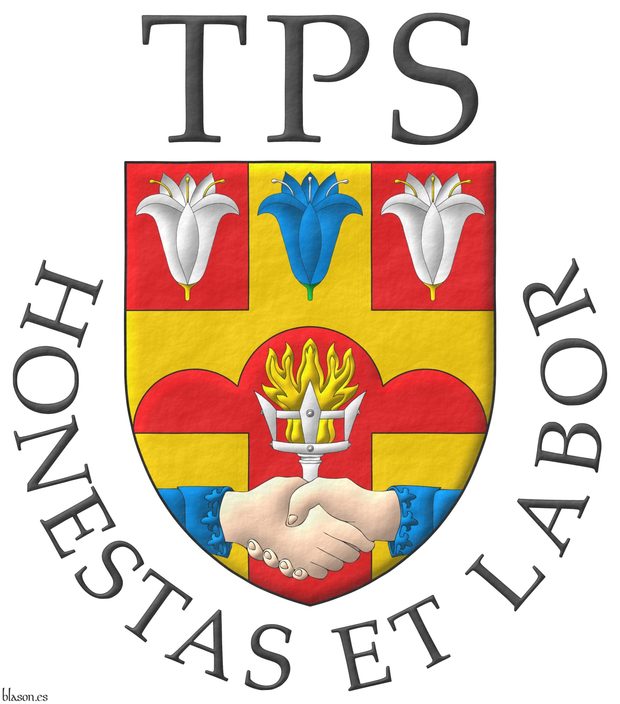
Illuminated and a rough finishing.
Blazon keywords: Gules, Cross, Or, Lily, Slipped, Seeded, Argent, Azure, Vert, In chief, Charged, Trimount, Counterchanged, Torch, In base, Two hands clasped, Motto and Motto (identification).
Style keywords: Rough, Outlined in sable, Illuminated and Pointed.
Classification: Socioeconomic, Created and Coat of arms.
Bearer: Trading Pro School.


UBU
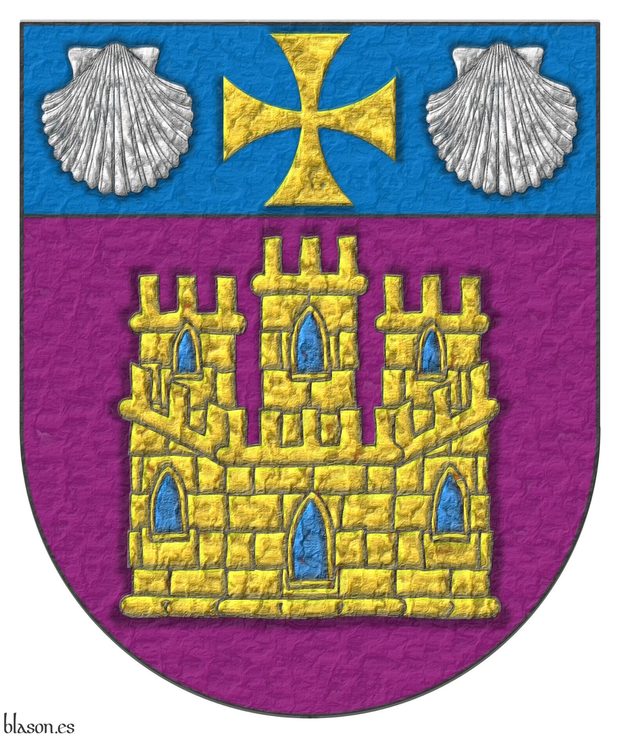
Purpure, a castle triple-towered Or, port and windows Azure, masoned Sable; on a chief Azure, a cross patty Or, between two escallops Argent.
Escudo de púrpura, un castillo de oro, aclarado de azur, mazonado de sable; un jefe de azur, cargado de una cruz patada de oro acompañada de dos veneras de plata.
Coat of arms interpreted as follows: with a semicircular (round) base; the field and the chief in the flat tinctures Purpure and Azure, with a lightly-hammered metal finish; and the four charges outlined in Sable, shaded, illuminated, and with a very hammered metal finish.
I hold the University Specialist degree in Real Estate Management and Administration, awarded by the Department of Private Law of the University of Burgos. These studies are structured over three academic years and are pursued online in combination with periods of traditional classes in the summers and on-site examinations during the winters. This was my first long-term online training experience.
Blazon keywords: Purpure, Or, Azure, Sable, Argent, Castle, Chief, Cross, Cross patty, Cross couped and Escallop.
Style keywords: Semi-circular, Illuminated, Shaded, Outlined in sable, Soft metal and Hard metal.
Classification: Interpreted, Socioeconomic and Education.
Bearer: Burgos, University of.


Vidriales, C. M.
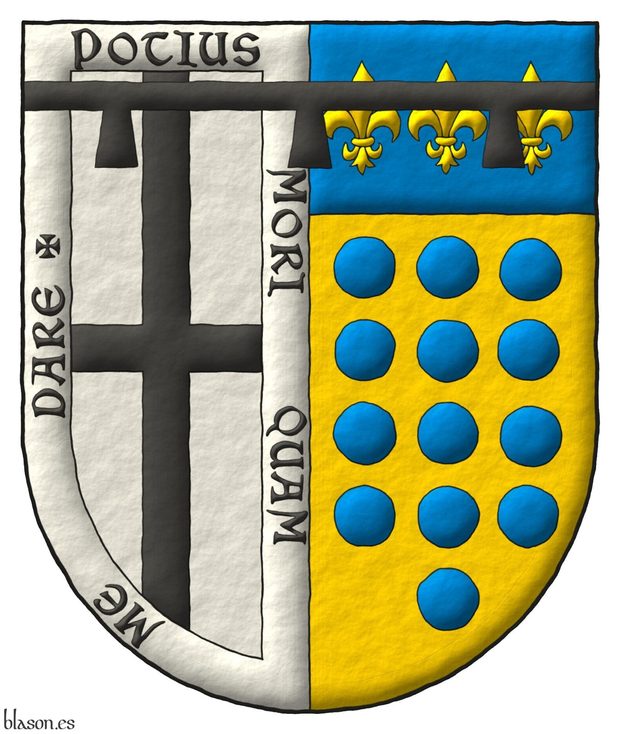
Interpreted coat of arms: with a semi-circular shape; illuminated with metals argent and or and colors sable and azure; outlined with sable; and a freehand finish.
Blazon keywords: Party per pale, Argent, Cross, Sable, Bordure, Motto, Or, Thirteen, Hurt, Hurt, torteau, pellet, pomme and golpe, Azure, Three, In pale, Four, Five, Chief, Fleur de lis, Label and Suspended.
Style keywords: Freehand, Semi-circular, Illuminated and Outlined in sable.
Classification: Coat of arms, Interpreted and Personal.
Bearer: Vidriales, C. M..


Vidriales, M. P.
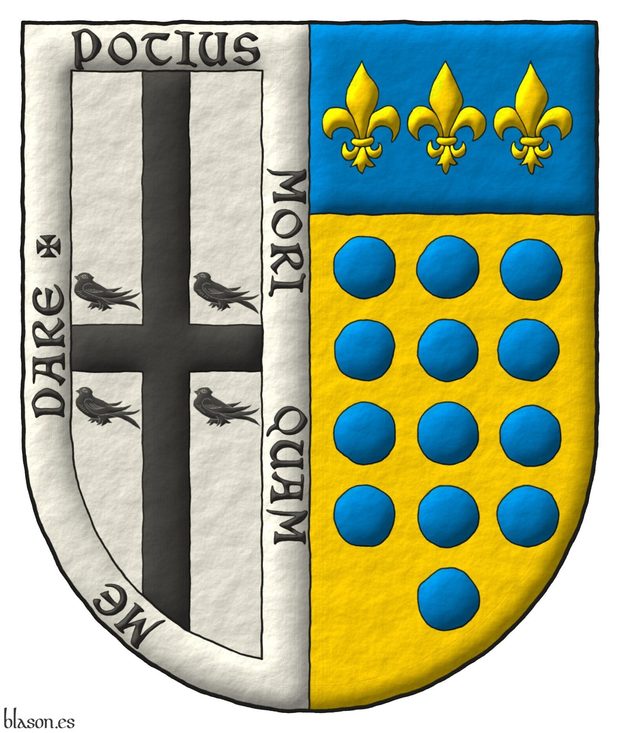
Interpreted coat of arms: with a semi-circular shape; illuminated with metals argent and or and colors sable and azure; outlined with sable; and a freehand finish.
Blazon keywords: Party per pale, Argent, Cross, Sable, Bordure, Motto, Or, Thirteen, Hurt, Hurt, torteau, pellet, pomme and golpe, Azure, Three, In pale, Four, Five, Chief, Fleur de lis, Cantoned and Martlet.
Style keywords: Freehand, Semi-circular, Illuminated and Outlined in sable.
Classification: Coat of arms, Interpreted and Personal.
Bearer: Vidriales, M. P..


YouTube
Heraldry videos
- Heraldic panther on the arms of the residential neighborhood of Centro, Val'Quirico, Tlaxcala, Mexico.
- Pennon of the residential village of Abundanttia, Val’Quirico, Tlaxcala, Mexico.
- Jean-Christophe Loubet del Bayle's arms.
- Arms of Juan Lanzagorta Vallin.
- How I emblazon the coat of arms of Richard Arthur Brinnhard.
- Coat of arms of Lucas Cruz's family.
- Pennon of Centro, Val’Quirico, Tlaxcala.
- Arms of Jean-Christophe Loubet del Bayle emblazoned by me step by step.
- Standard of Rudolf Juchter van Bergen Quast.
- Coat of arms of Lucas Cruz family designed by him and me and emblazoned by me.
- Coat of arms of Seth Rawson emblazoned by me v.2.
- Coat of Arms of Seth Rawson.
- v.2 Party per chevron: How to blazon and emblazon it, example, Laird Sky's arms.
- v.1 Party per chevron: How to blazon and emblazon it, example, Laird Sky's arms.
- Coat of Arms of Mr. Paul Bengamin Lindsay.
Heraldic channel
My heraldic channel at YouTube is youtube.com/user/ASalmeronTube.
Categories: Technology, Social networks, Cross, Argent, Pomegranate, Bridge, Tower, Escutcheon, Tree, Fish, Bordure, Compony, Eagle, Lion, Pale, Castle, Bell tower, Plough share, Ship, Semé and Fleur de lis.
-
Language
-
Categories of heraldry
-
Divisions of the field
- Without divisions
- Party per pale
- Party per fess
- Party per bend
- Party per bend sinister
- Tierce
- Tierce sinister
- Tierced per pale
- Tierced per fess
- Tierced per bend
- Tierced pallwise inverted
- Quarterly
- Quarterly per saltire
- Gyronny
- Party per fess, the chief per pale
- Party per pale, the sinister per fess
- Party per fess, the base per pale
- Party per pale, the dexter per fess
- Chapé
- Chaussé
- Embrassé
- Contre-embrassé
- Party per chevron
- Enté
- Enté en point
- Flanched
-
Metals
-
Colours
-
Furs
-
Other tinctures
-
Ordinaries and sub-ordinaries
-
Diminutives of the ordinaries
-
Geometric charges
-
Composite ordinaries
-
Inanimate charges from Nature
Atom, Crescent, Diamond, Emerald, Estoile, Increscent, Lightning flash, Moon, Mount, Mullet, Mullet of four points, Orbital, Plough of Ursa Major, Rainbow, Ray of the sun, River, Sea, Snowflake, Sun, Sun in splendour, Sun of May, Terrestrial globe, Trimount, Water and Wave.
-
Vegetal charges from Nature
Acorn, Apple, Apple tree, Ash, Bluebonnet, Camellia, Chrysanthemum, Cinquefoil, Cornflower, Dogwood flower, Double rose, Eguzki-lore, Elm, Fleur de lis, Flower, Gourd, Holm oak, Hop cone, Indian paintbrush, Kapok tree, Laurel, Lily, Linden, Lotus flower, Madonna lily, Mexican cedar tree, Oak, Olive tree, Palm tree, Plantain plant, Pomegranate, Poplar leaf, Rose, Shamrock, Sunflower, Thistle, Tree, Tulip, Vine and Wheat.
-
Animal charges from Nature
Badger, Bald eagle, Barbel, Barn owl, Bear, Beaver, Bee, Beetle, Bighorn sheep, Binson, Blackbird, Boar, Brach hound, Bull, Cow, Doe, Dog, Dolphin, Dove, Eagle, Elephant, Falcon, Female figure, Fish, Flame, Fly, Fox, Frog, Goat, Goldfinch, Goose, Heron, Horse, Hummingbird, Jaguar, Lark, Leopard, Lion, Lion passant, Lion rampant guardant, Lioness, Lynx, Male figure, Martlet, Merino ram, Owl, Panther, Parrot, Peacock, Pelican, Pelican in her piety, Pronghorn, Puffin, Quetzal, Raven, Roe deer, Rooster, Savage, Seagull, Serpent, She-wolf, Stag, Starling, Talbot, Turtle, Tyger, Vulture, Warren hound and Wolf.
-
Parts of natural charges
Arm, Beak, Branch, Caboshed, Chest, Claw, Covert, Dorsal fin, Eagle claw, Ear of wheat, Ermine spot, Escallop, Feather, Foot (palmiped), Foreleg, Forepaw, Hand, Head, Heart, Hoof, Leaf, Neck, Ostrich feather, Palm frond, Paw, Roe deers' attires, Shoulder, Sprig, Stags' attires, Stem, Swallow-tail, Tail, Tail addorsed, Tail fin, Talon, Tibia, Tooth, Trunk, Trunk (elephant), Two hands clasped, Two wings in vol, Udder, Wing and Wrist.
-
Artificial charges
Ace of spades, Anchor, Anvil, Arch, Arm vambraced, Armillary sphere, Arrow, Axe, Bell, Bell tower, Beret, Bonfire, Book, Bookmark, Bow, Branding iron, Bridge, Broken, Buckle, Cannon, Cannon dismounted, Cannon port, Canopy roof, Carbuncle, Castle, Celtic Trinity knot, Chain, Chess rooks, Church, Clarion, Clay pot, Closed book, Club, Column, Comb, Compass rose, Conductor's baton, Cord, Covered cup, Crozier, Crucible, Cuffed, Cup, Cyclamor, Dagger, Displayed scroll, Double vajra, Drum, Ecclesiastical cap, Fanon, Federschwert, Fleam, Four crescents joined millsailwise, Galician granary, Garb, Gauntlet, Geometric solid, Grenade, Halberd, Hammer, Harp, Host, Hourglass, Key, Key ward, Knight, Knot, Lantern, Letter, Line, Loincloth, Maunch, Menorah, Millrind, Millstone, Millwheel, Monstrance, Mortar, Mullet of six points pierced, Nail, Non-classic artifact, Norman ship, Number, Oar, Oil lamp, Open book, Page, Pair of pliers, Pair of scales, Parchment, Pestle, Piano, Pilgrim's staff, Plough share, Polish winged hussar, Port, Portcullis, Potent, Quill, Ribbon, Rosette of acanthus leaves, Sabre, Sackbut, Sail, Scroll, Scythe, Sheaf of tobacco, Ship, Skirt, Spear, Spear's head, Stairway, Star of David, Step, Sword, Symbol, Tetrahedron, Torch, Tower, Trident, Trumpet, Turret, Two-handed sword, Wagon-wheel, Water-bouget, Wheel, Winnowing fan and With a turret.
-
Immaterial charges
Angel, Archangel, Basilisk, Dragon, Dragon's head, Garuda, Golden fleece, Griffin, Heart enflamed, Justice, Mermaid, Our Lady of Mercy, Ouroboros, Paschal lamb, Pegasus, Phoenix, Sacred Heart of Jesus, Saint George, Sea-griffin, Sea-lion, Trinity, Triton, Unicorn, Winged hand and Wyvern.
-
External elements
-
Heraldic creations
-
References
-
Formats
-
Keywords on this page
Between, Watercolor, Proper, Pointed, Azure, Bend sinister, Boa, Bordure, Wreath, Charged, Crest, Five, Crown, Created, Cross, Cross couped, Four, Outlined in sable, Two, Emblem, Coat of arms, Fess, Fleur de lis, Personal, Gules, Illuminated, Interpreted, Chief, Mantling, Langued, Motto, Lion, Semi-circular, Military, Or, Pale, Party per pale, Argent, Without divisions, Rampant, Religious, Hurt, torteau, pellet, pomme and golpe, Sable, Vert, Saltire, Freehand, Three, One and Helm.

